14900K vs 7950X3D: putting the best processors on the market to the test
Which flagship chip should you buy, the 14900K or 7950X3D?
Sign up for breaking news, reviews, opinion, top tech deals, and more.
You are now subscribed
Your newsletter sign-up was successful
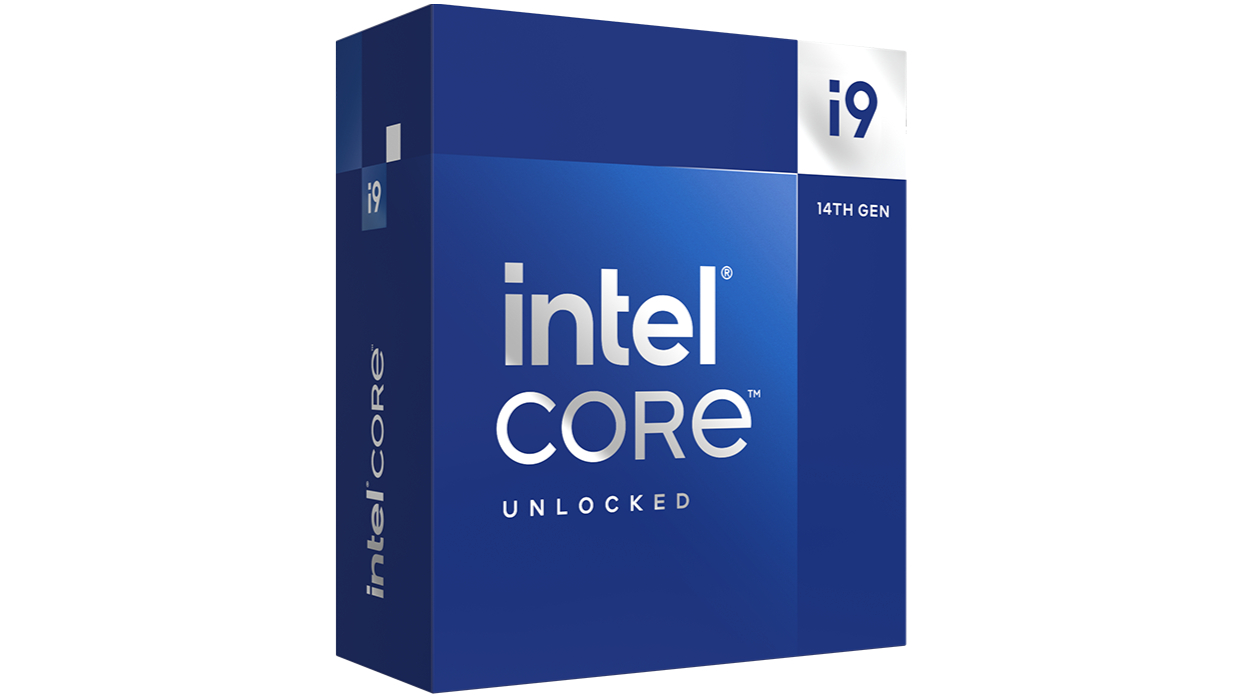
Efficiency Cores: 16
Performance Cores: 8
Threads: 32
Base Clock (E-Cores): 2.4 GHz
Base Clock (P-Cores): 3.3 GHz
Boost Clock (E-Cores): 4.4 GHz
Boost Clock (P-Cores): 5.6 GHz
Total Cache: 68MB
TDP: 125W
Intel's latest flagship processor is the best-performing chip we've tested yet, but is its performance enough to make it worth the upgrade from the 13th-gen, or is last-gen's powerful flagship the better value?
Pros
- Best-in-class performance (barely)
- No price increase
- Very low idle power usage
- Can go as high as 6.0GHz
Cons
- Barely any gen-on-gen improvement
- Gets extremely hot
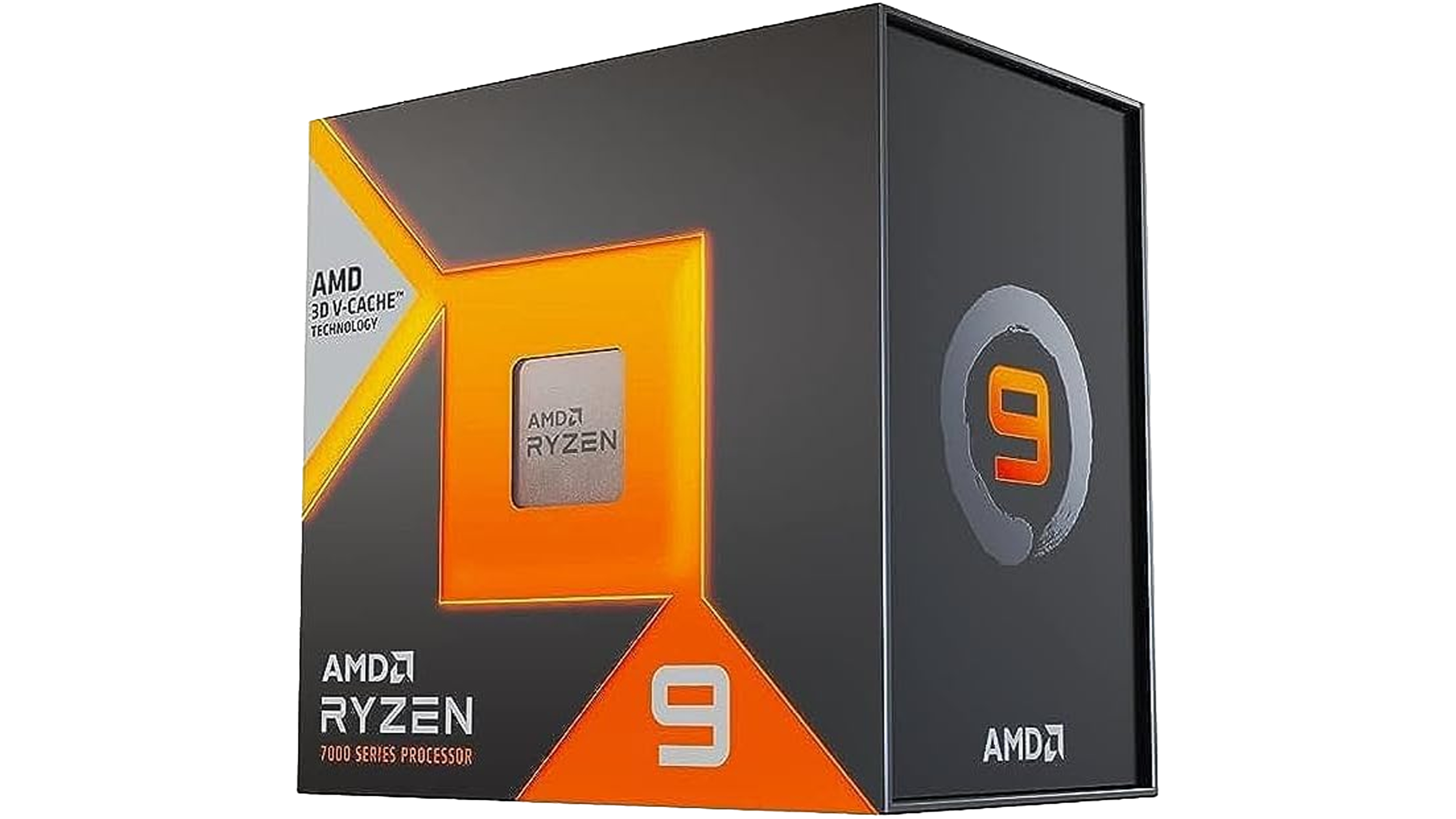
Efficiency Cores: N/A
Performance Cores: 16
Threads: 32
Base Clock: 4.2 GHz
Turbo Clock: 5.7 GHz
Cache: 145MB Total
TDP: 120W
The AMD Ryzen 9 7950X3D is everything that a gamer could have hoped for with Zen 4 and 3D V-Cache, delivering the same generational performance improvement that we saw with the Ryzen 7 5800X3D with better energy efficiency and some extras thrown in to really sweeten the deal.
Pros
- Outstanding gaming performance
- Excellent price
- DDR4 and DDR5 support
Cons
- Absolutely drunk on (electrical) power
- Runs hot, so get a great cooler
If you’re weighing up 14900K vs 7950X3D then you need to ask yourself an important question. It all comes down to whether or not you want the highest amount of cores clocked at the fastest speeds or want to rely on different tricks aimed at making gaming faster.
While the Intel Core i9-14900K doesn’t do much to push the needle forward compared to its predecessor, there’s no denying the raw technical prowess on display. Offering best in class performance with no price increase over the last iteration, this model should be a homerun against other Intel chips and its competition, but there really isn’t much new here to convert anyone who’s already running bleeding-edge Raptor Lake.
It’s a case of iteration over innovation with the AMD Ryzen 9 7950X3D as well. The second generation of 3D V-Cache processors from Team Red, this CPU ups the L3 Cache for improved gaming performance on a lower TDP for more efficient performance. At the time of its release at the beginning of 2023 we described it as the “everything that a gamer could have hoped for” as it retook the lead from Intel’s Raptor Lake models from late last year.
But that was then, and there’s a whole new generation of Intel processors to contend with. Is everything we said about the 7950X3D still true? That’s why we’re comparing 14900K vs 7950X3D on their price, technical specifications, and performance to help you find out which model is right for your next build. For the non-3D variant, we’re also comparing 14900K vs 7950X, too.
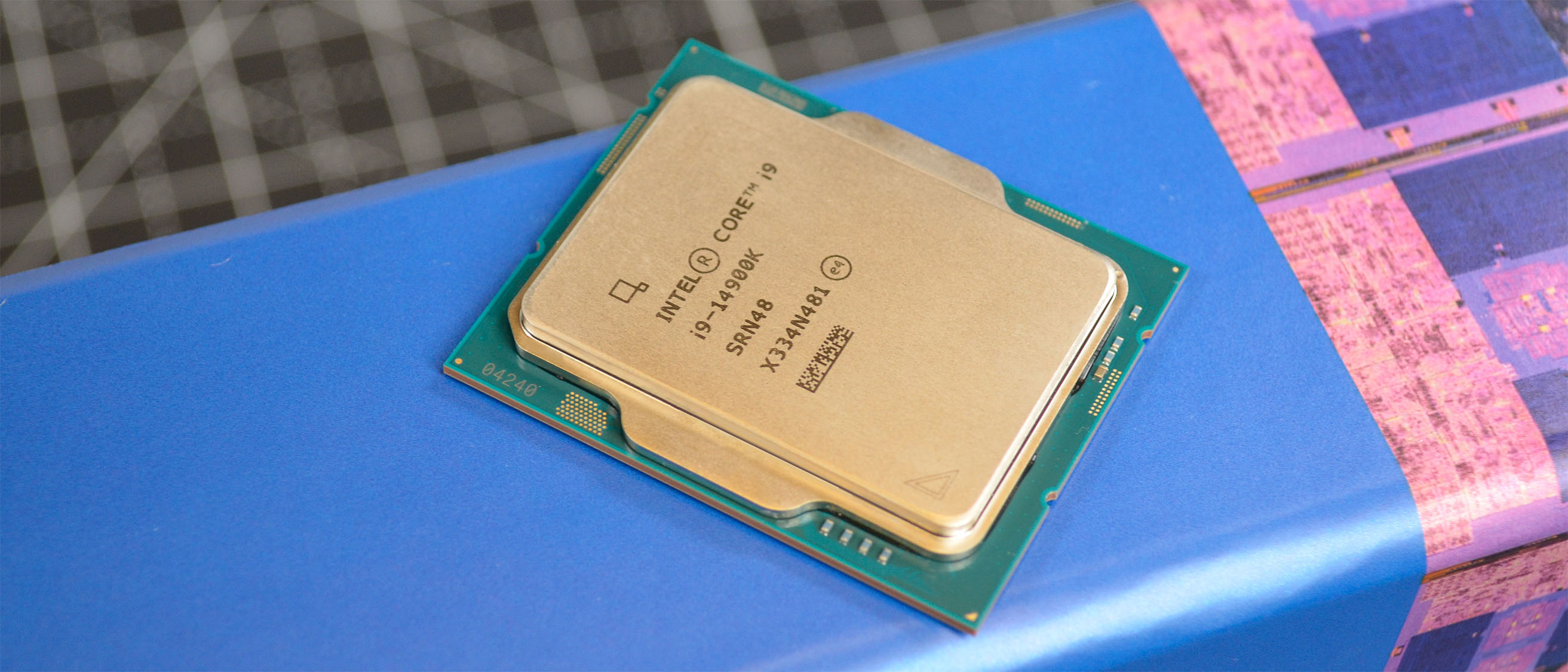
14900K vs 7950X3D: Price
There’s no getting around the fact that whether you’re considering the Intel Core i9-14900K or the AMD Ryzen 9 7950X3D, that they’re going to cost you a pretty penny. The 14th Gen i9 CPU’s price remains unchanged from its predecessor, the 13900K, with its $589 / £448 / AU$854 sticker price. It’s the most expensive processor available from Team Blue, but the ceiling doesn’t stop here.
That’s because the AMD Ryzen 9 7950X3D currently retails for $699 / £531 / AU$1,014 making it the priciest consumer-grade processor for gaming on the market right now. As a frame of reference, that’s considerably more expensive than the 7950X which debuted last year at $599 / £455 / AU$869. That’s an increase of $100 / £83 / AU$160 to be specific (or about 16%).
Whether or not the AMD Ryzen 9 79050X3D justifies its high price tag will be tested later on, but for now we can analyze the hardware as it stands. Intel’s latest flagship is 24 cores and 32 threads with AMD’s refresh running 16 cores and 32 threads. Considering the cheaper price point of the Intel chip and the higher core count, the 14900K takes the lead in terms of value for money here.
Sign up for breaking news, reviews, opinion, top tech deals, and more.
- Winner: Intel Core i9-14900K
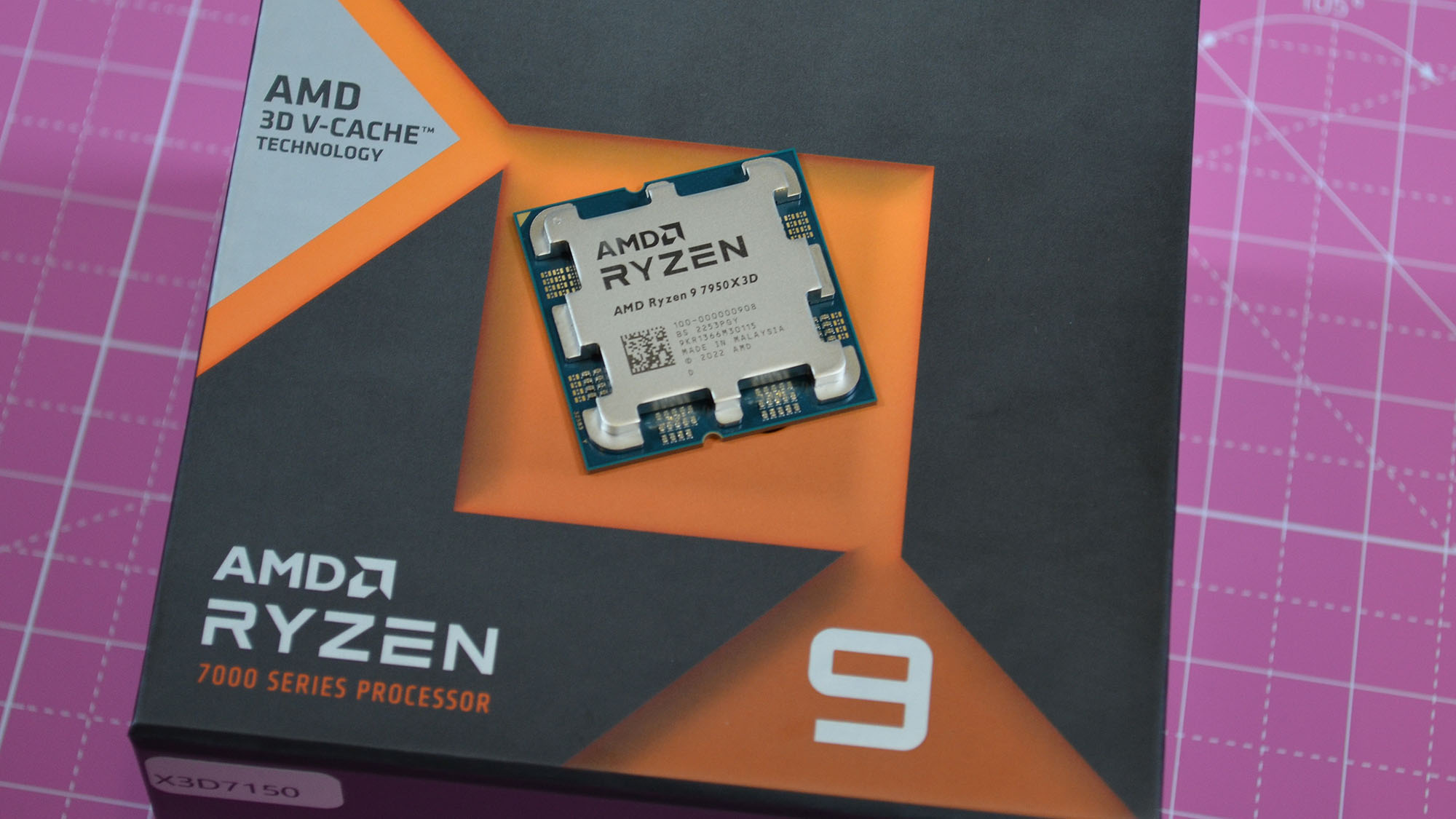
14900K vs 7950X3D: Specs & features
Both the 14900K and the 7950X3D are incredibly powerful top-end processors for gaming, but they have many differences that set them apart. For a start, the 14th-Gen i9 is iterative on the previous Raptor Lake hardware with the AM5 socket and 125W TDP.
In contrast, the 7950X3D drops the TDP down from the original’s 170W to 125W and lowers the base clock speed of the first iteration with its reliance on added L3 Cache. Here’s the technical specs fully explored in detail.
| Header Cell - Column 0 | Intel Core i9-14900K | AMD Ryzen 9 7950X3D |
|---|---|---|
| Performance Cores | 8 | 16 |
| Efficiency Cores | 16 | — |
| Threads | 32 | 32 |
| P-Core Base Clock | 3.20GHz | 4.20GHz |
| P-Core Boost Clock | 5.90GHz | 5.70GHz |
| E-Core Base Clock | 2.20GHz | — |
| E-Core Boost Clock | 4.40GHz | — |
| L3 Cache | 36MB | 128MB |
| TDP | 125W | 120W |
| Motherboard Socket | LGA 1700 | AM5 |
While the AMD Ryzen 9 7950X3D boasts a higher clock speed and more cores aimed at pure performance, the Intel Core i9-14900K takes the win for its eight additional cores and lower price tag overall.
- Winner: Intel Core i9-14900K
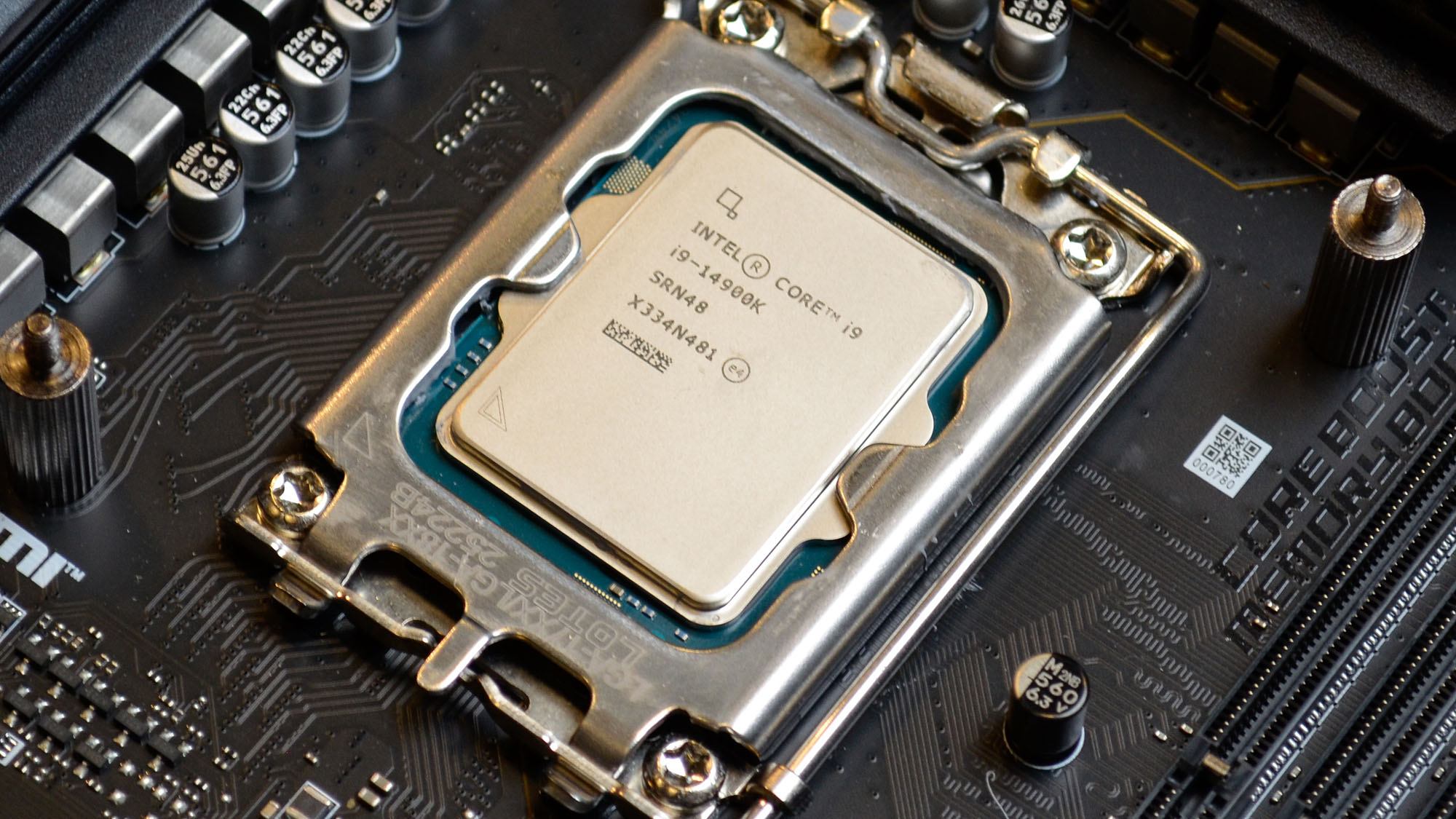
14900K vs 7950X3D: Performance
This is what it all comes down with 14900K vs 7950X3D, how each bleeding-edge chip performs. In our synthetic benchmarks, the 14900K takes the lead with the bulk of single core benchmarks including Geekbench 6.1, 3D Mark CPU profile, and single-threaded PassMark.
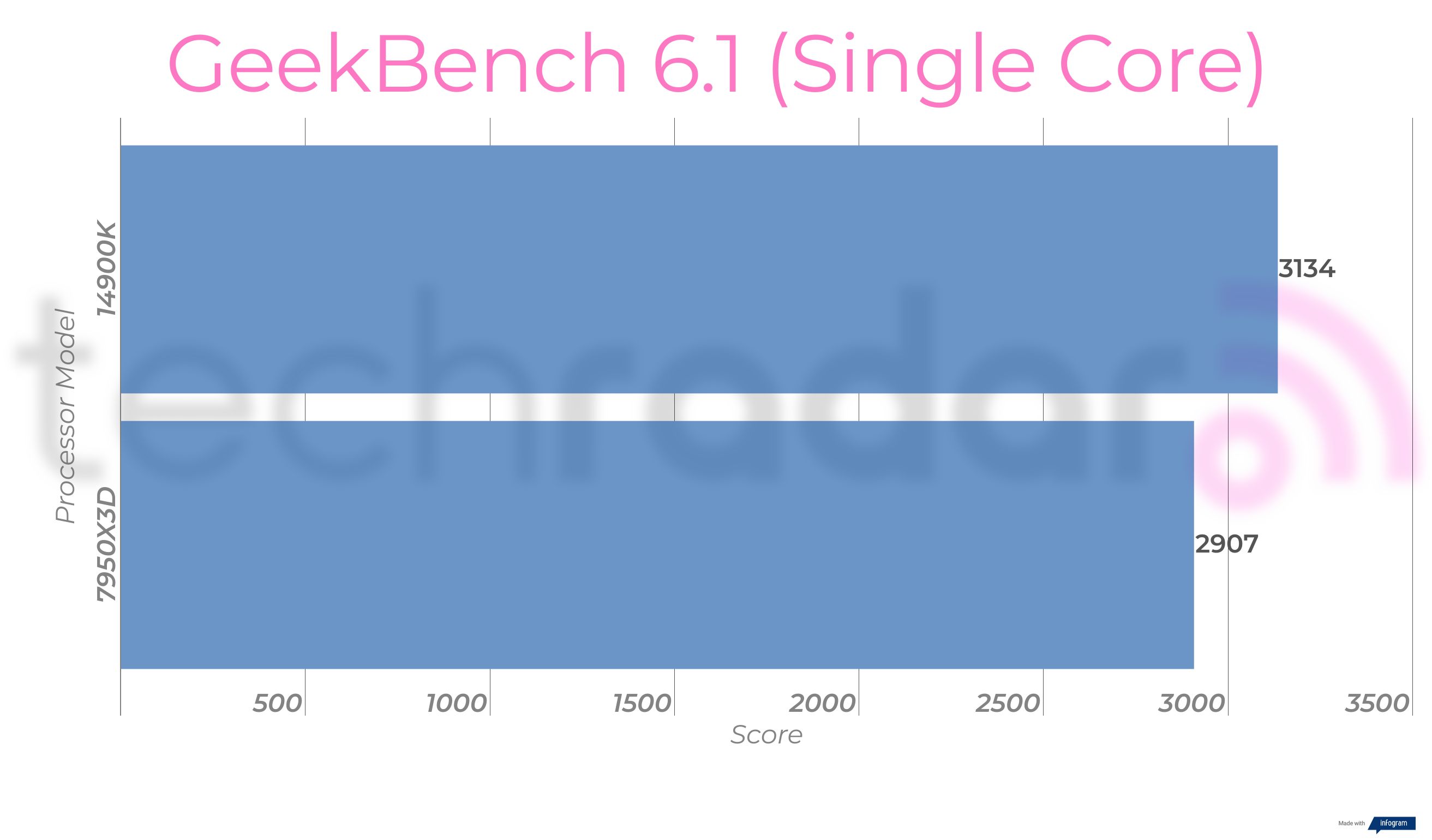
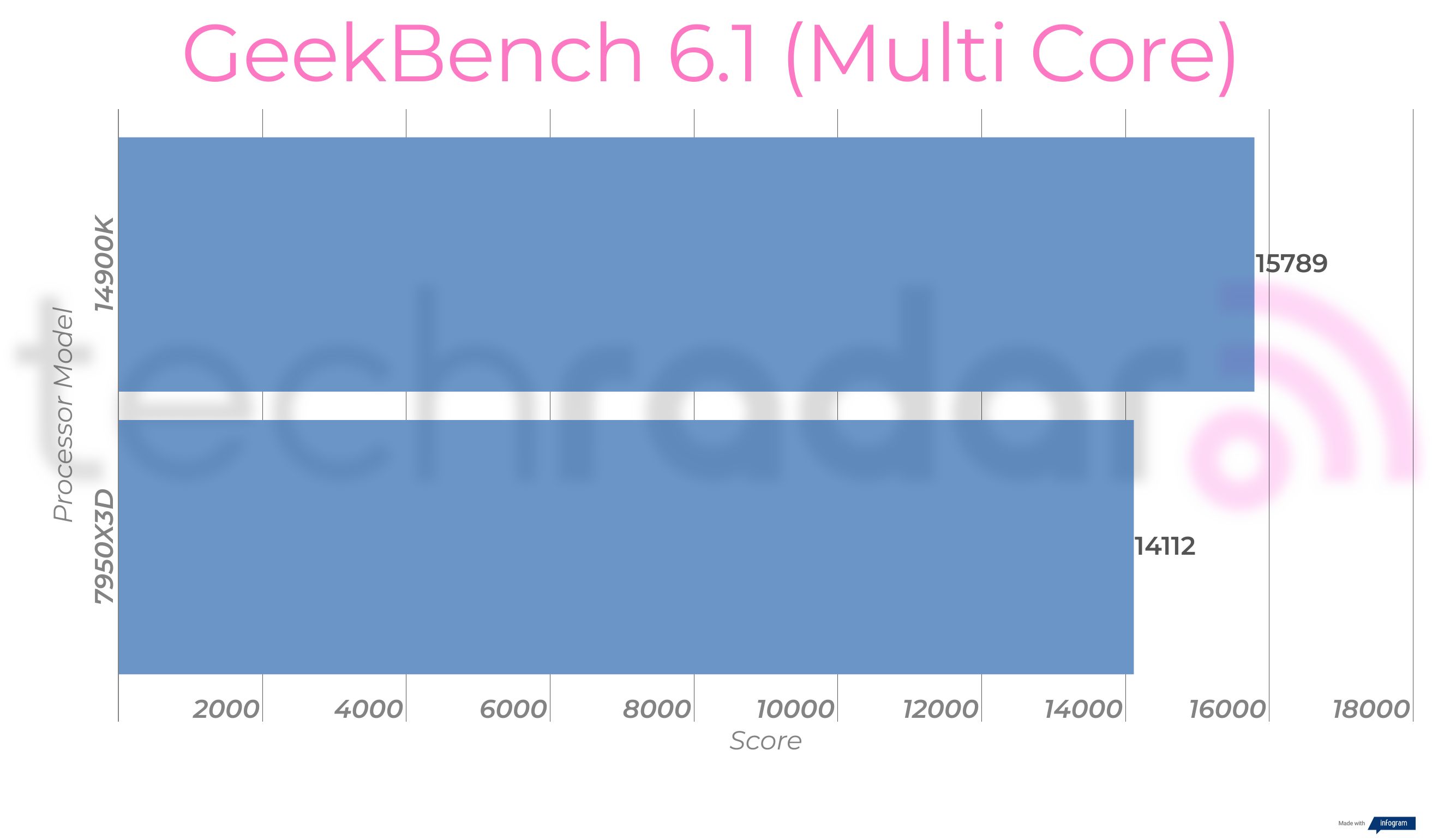
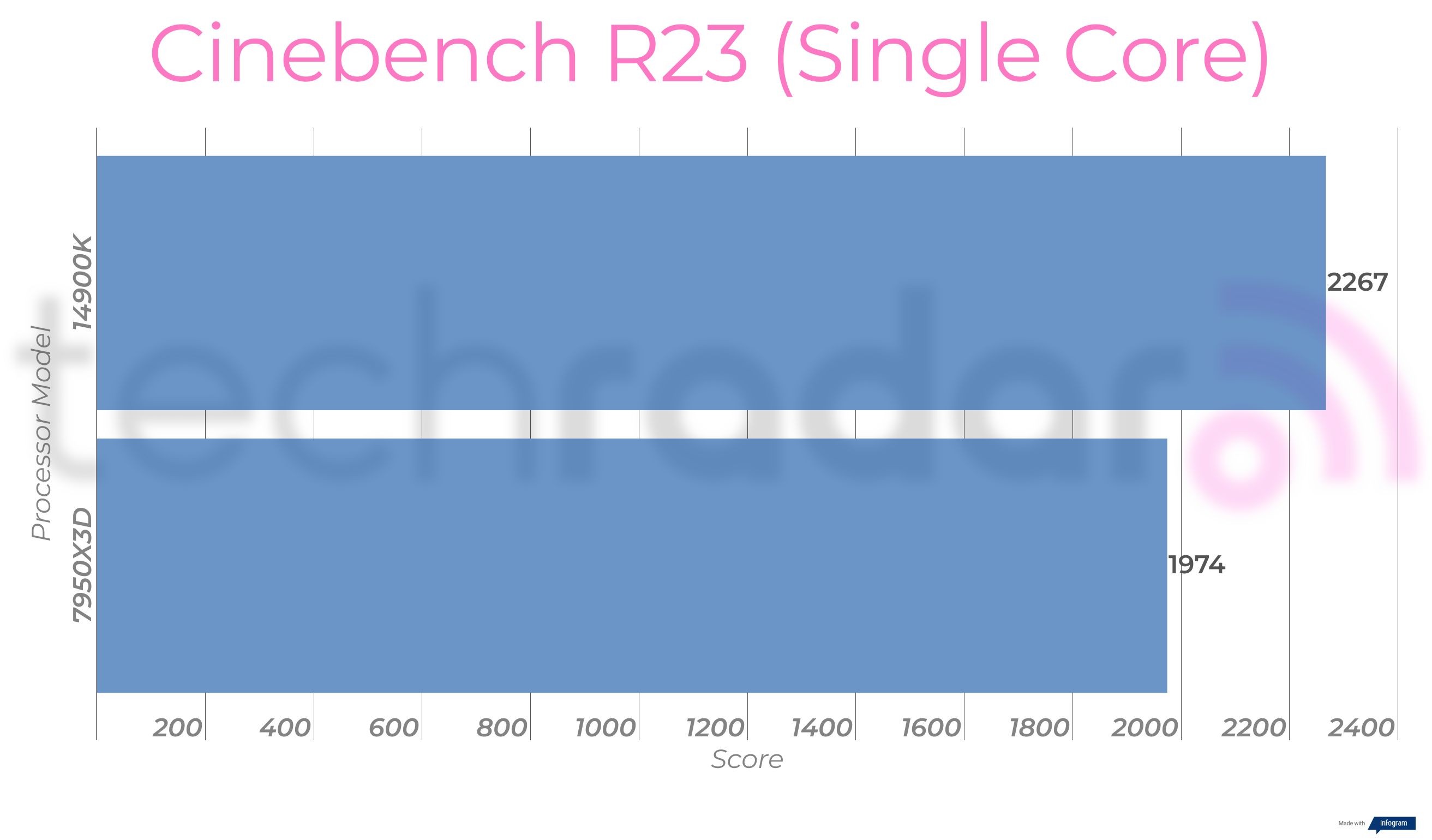
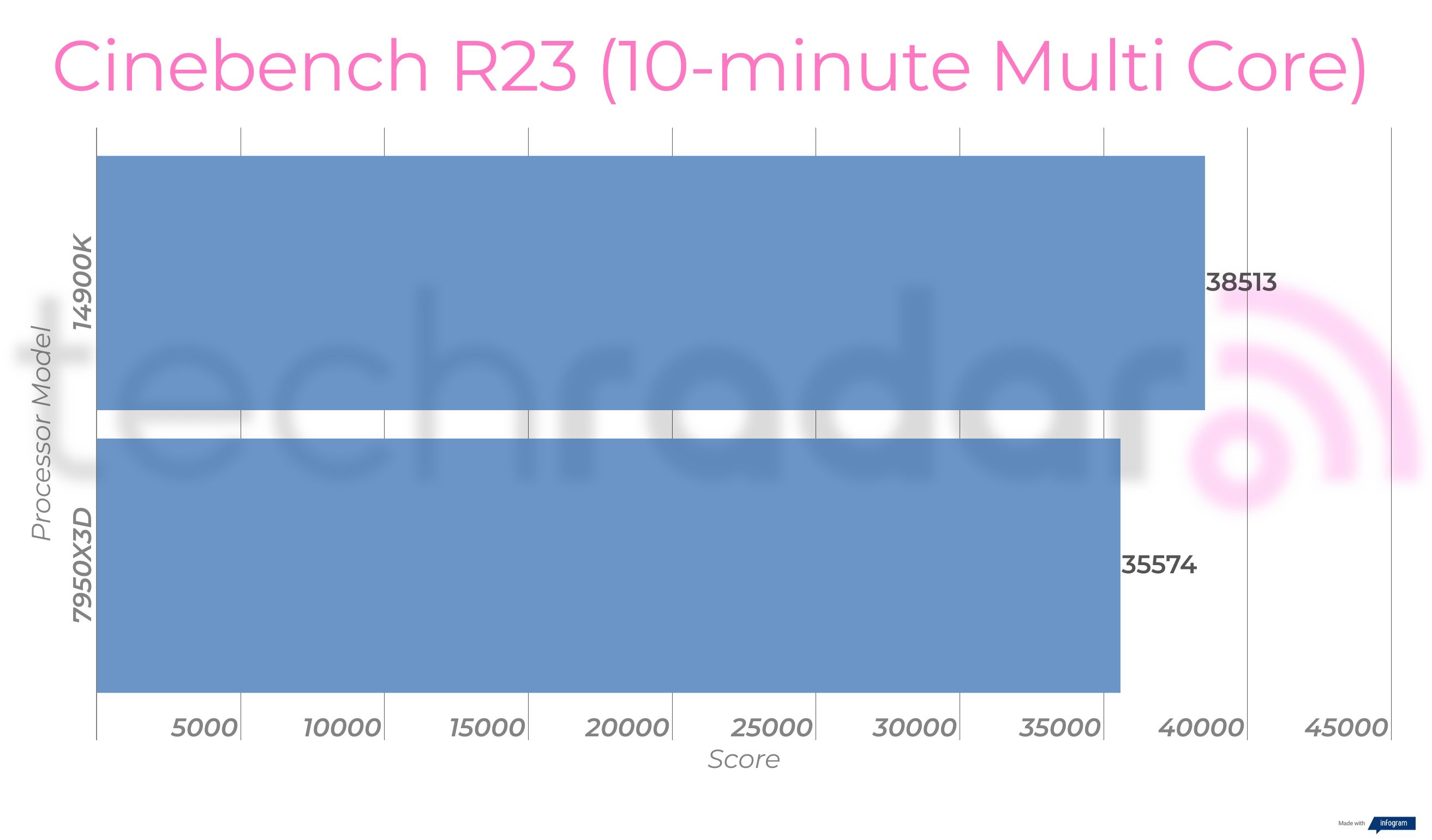
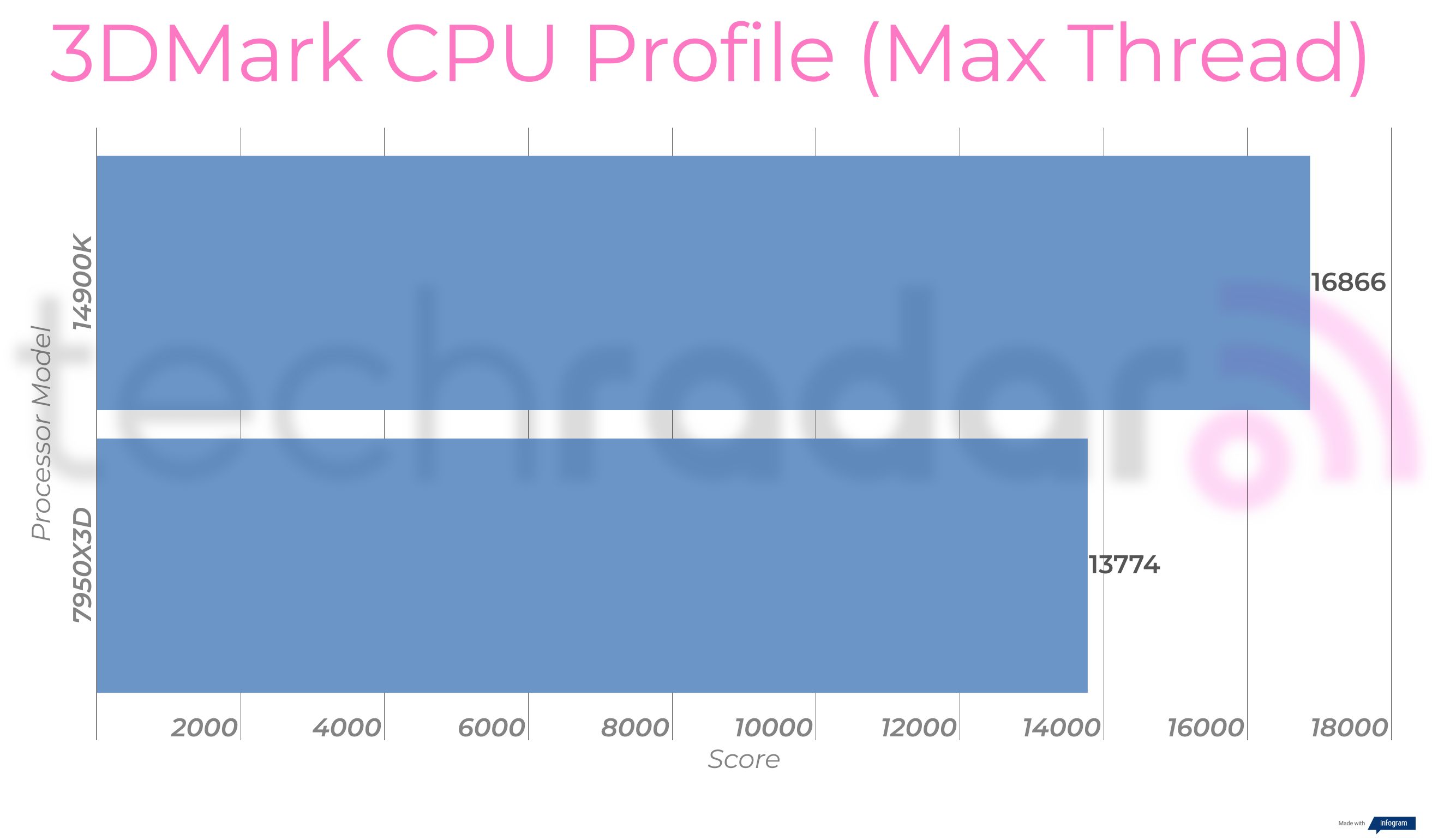
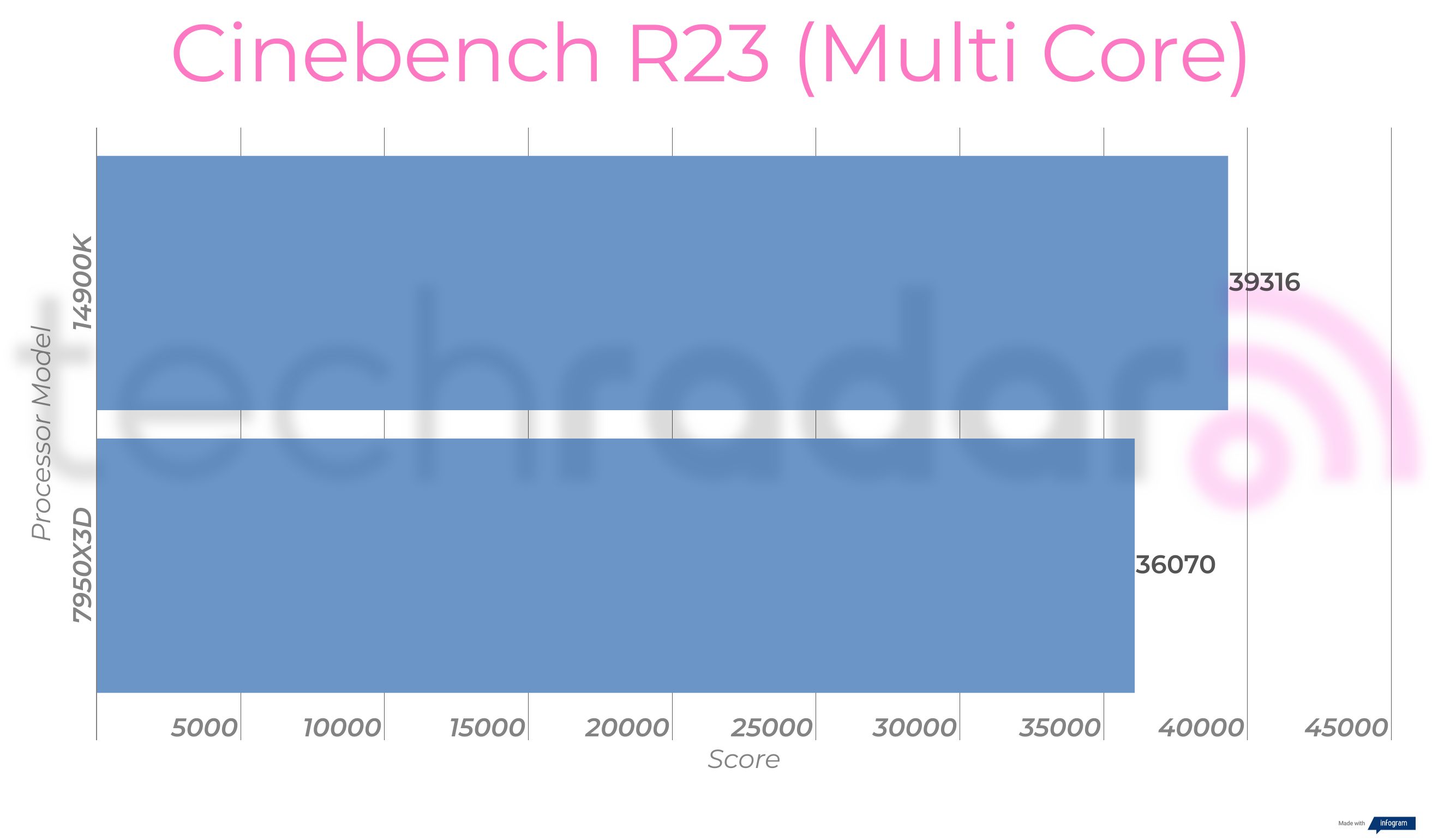
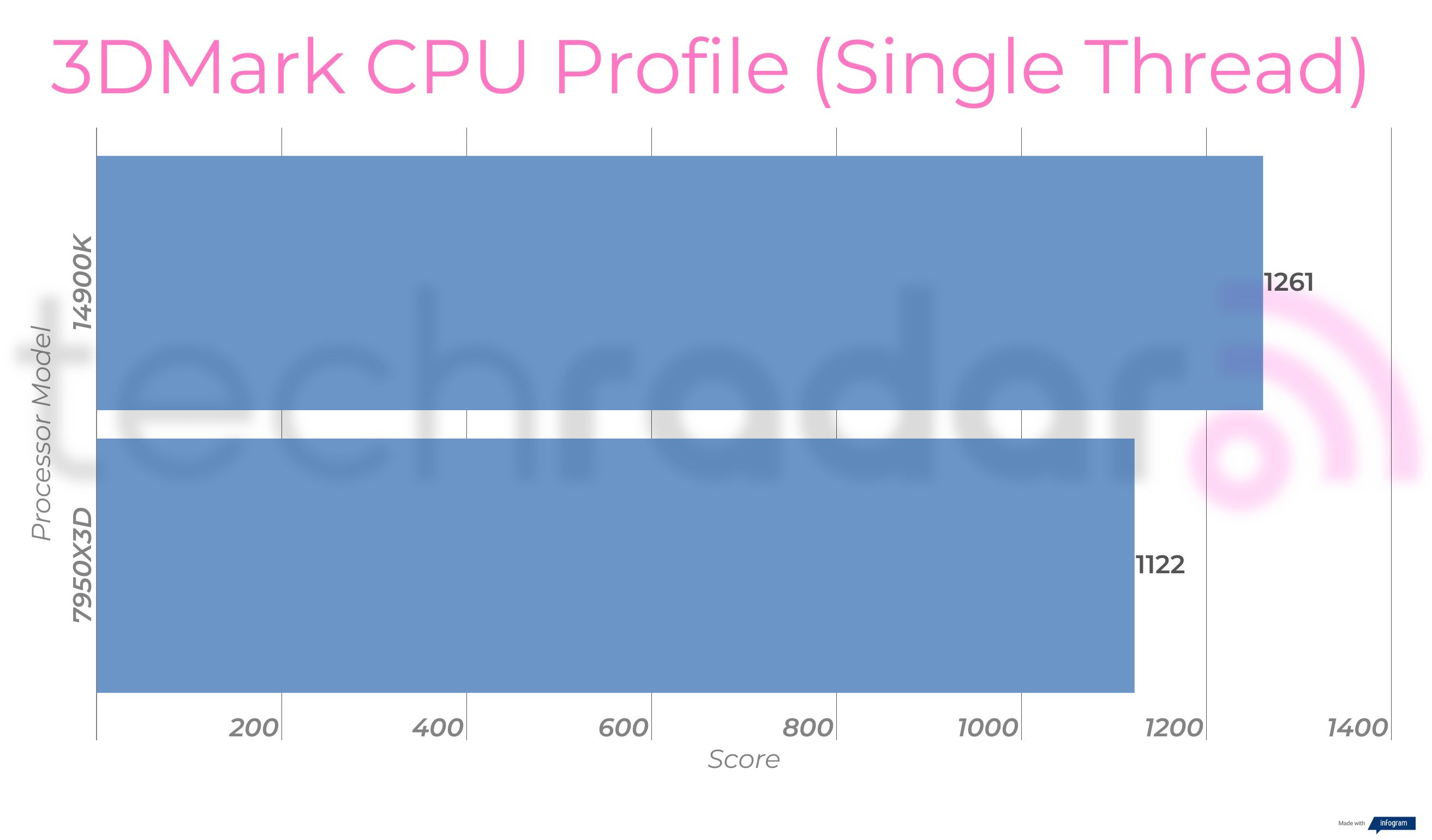
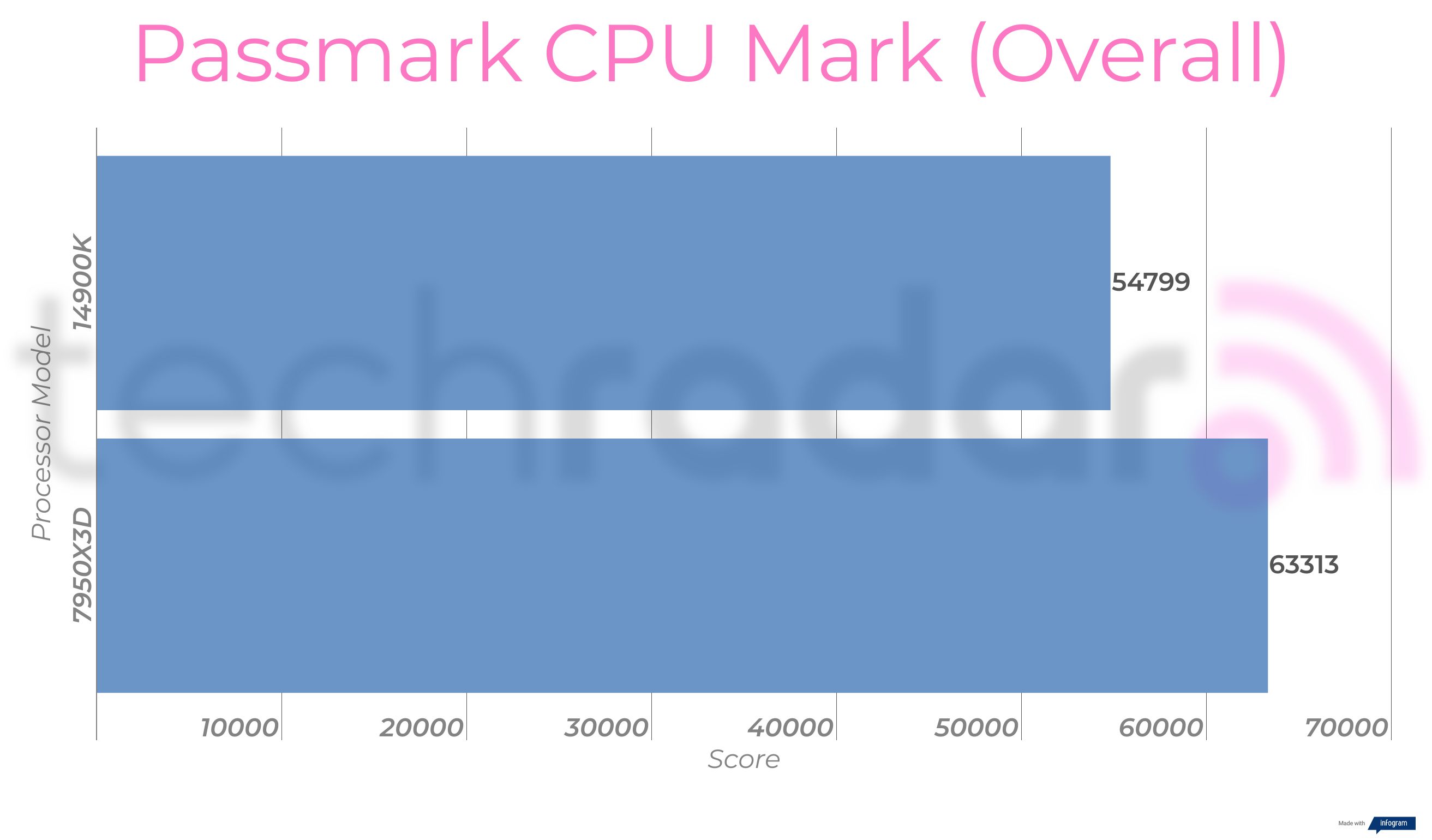
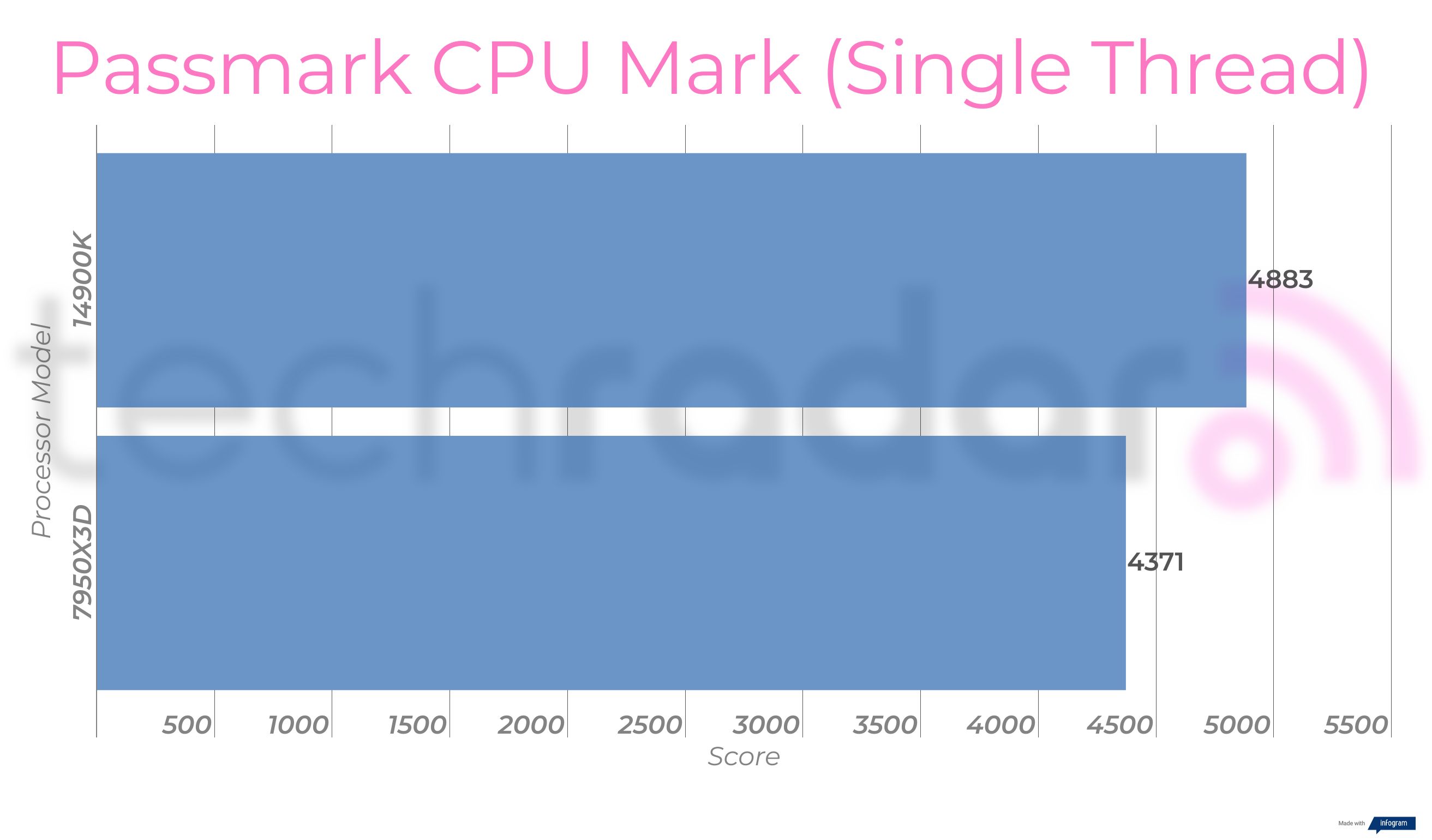
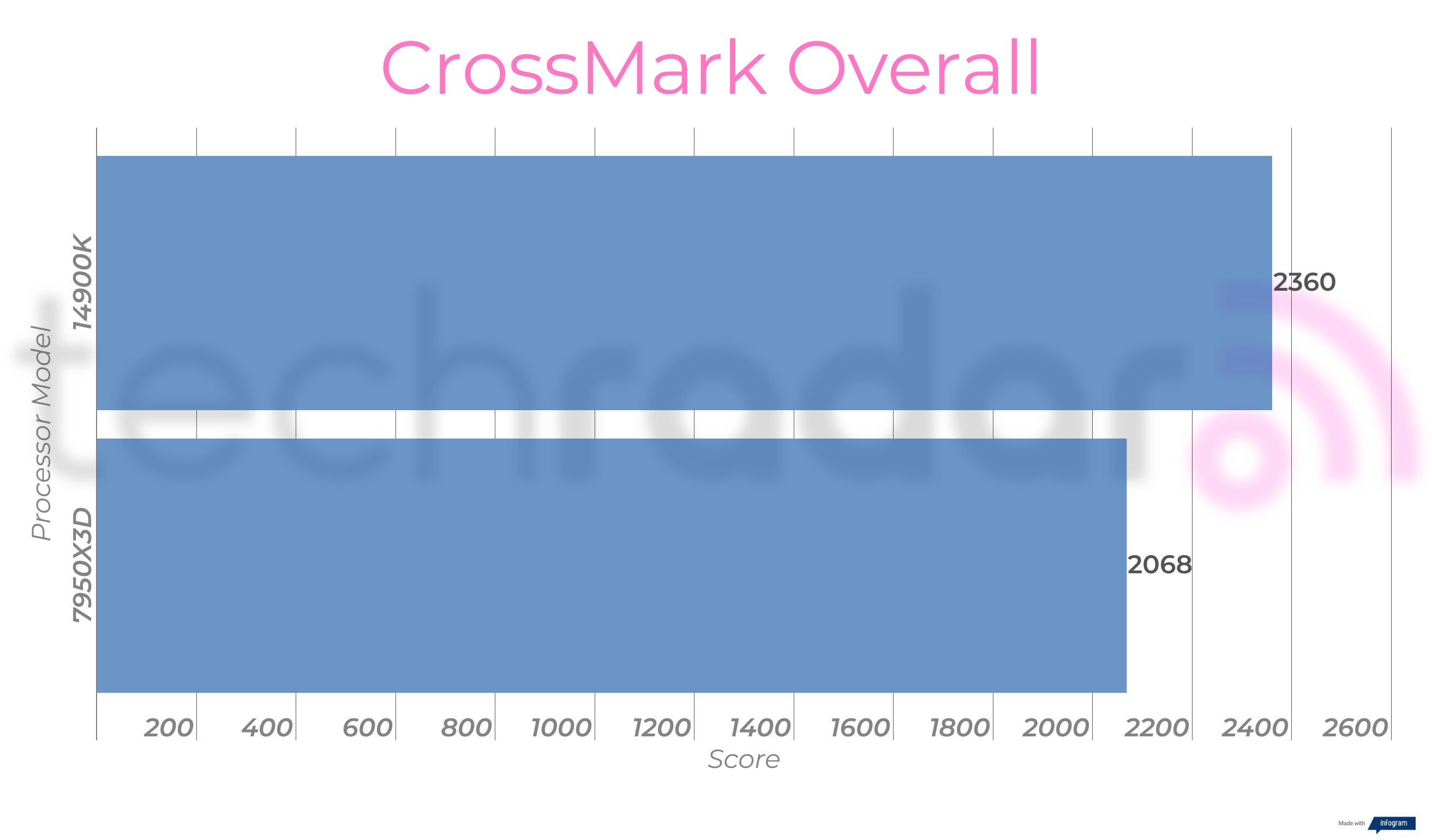
However, that’s not to count out the 7950X3D that holds its own in the overall PassMark CPU Mark. Team Blue takes this one. It goes to show how those eight extra cores can make all the difference.
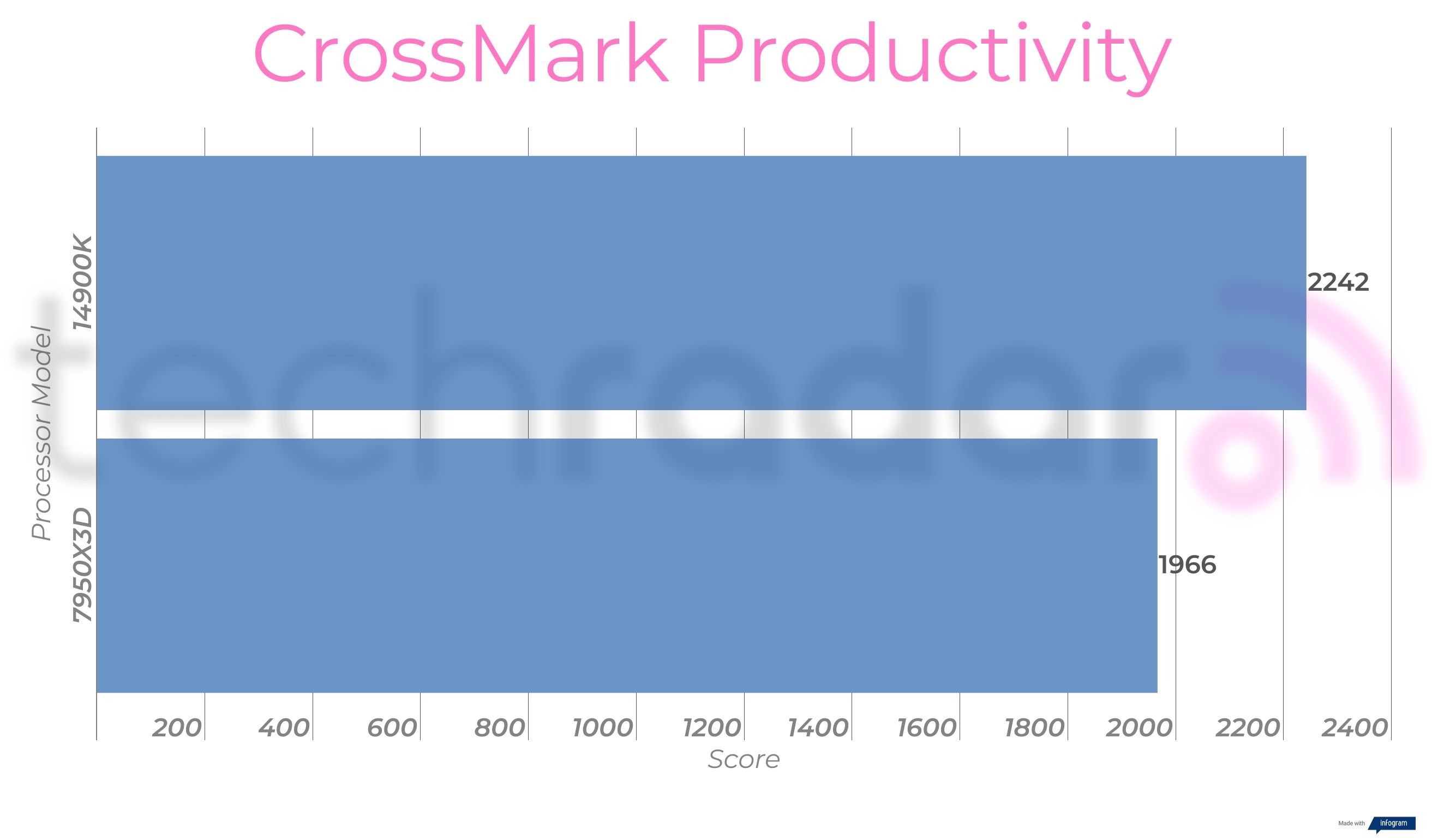
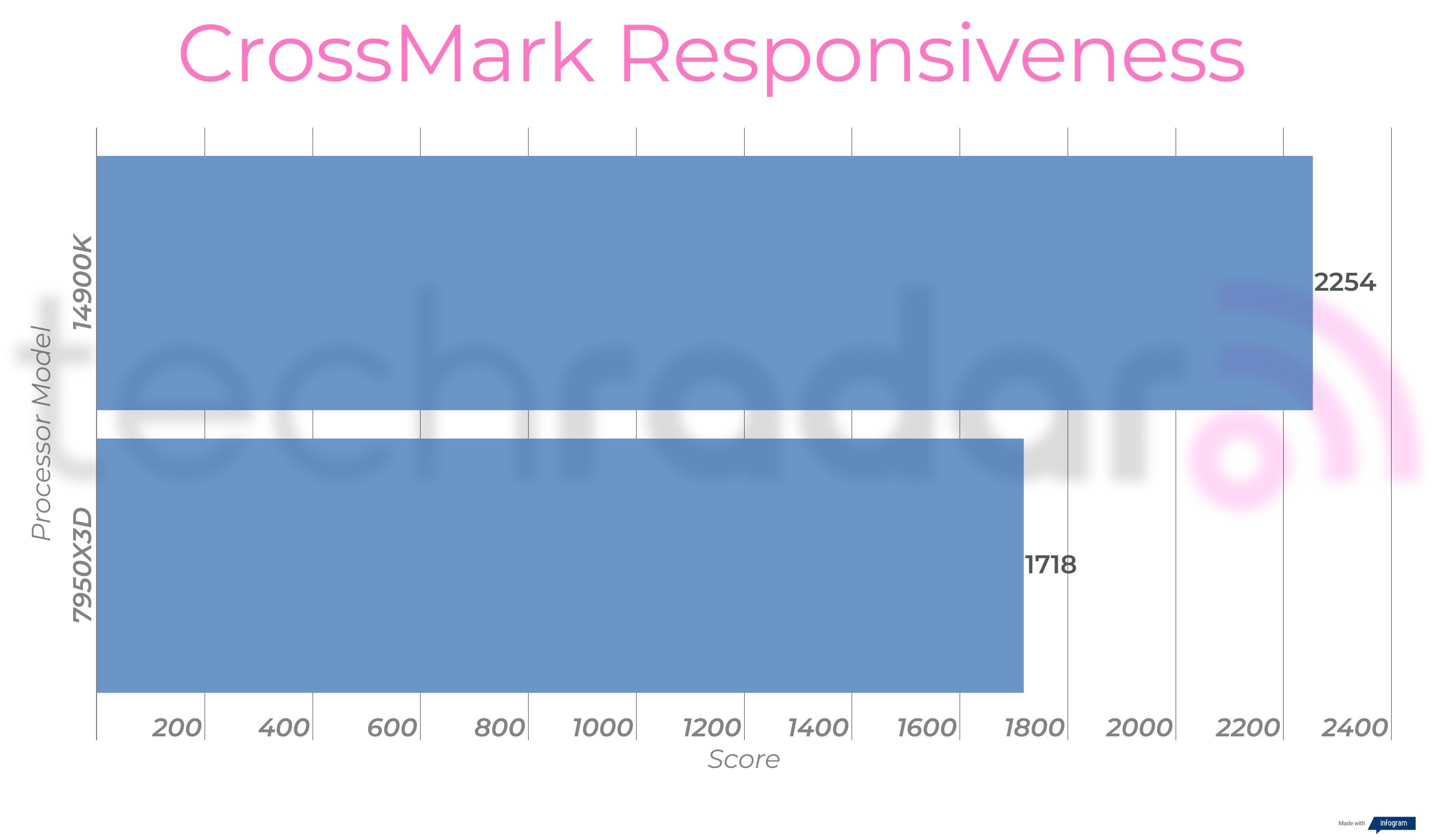
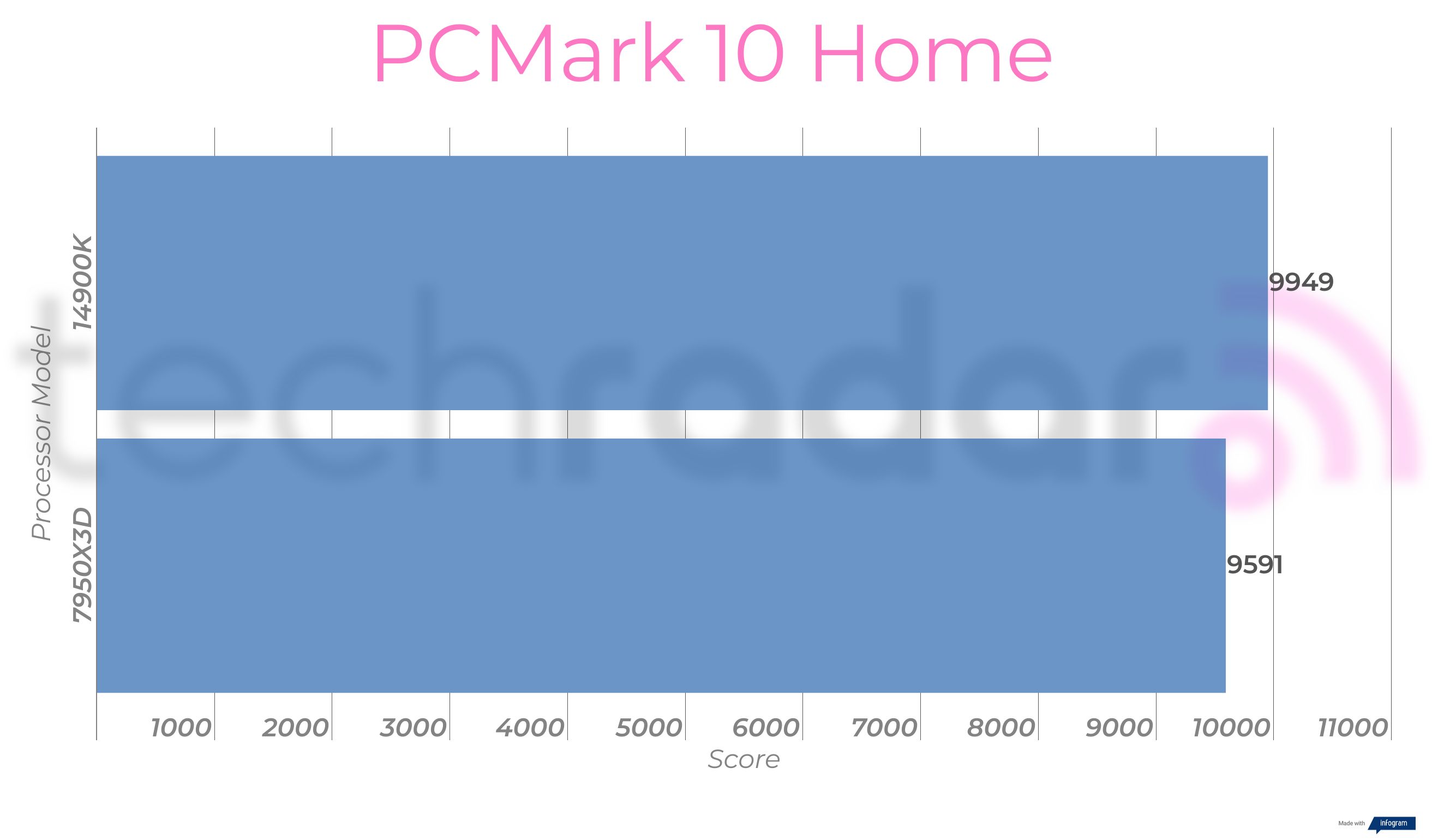
Productivity tasks see a similar advantage with the Intel Core i9-14900K coming out on top against the AMD Ryzen 9 7950X3D. In total, there’s a performance difference of up to 14% in Team Blue’s favor.
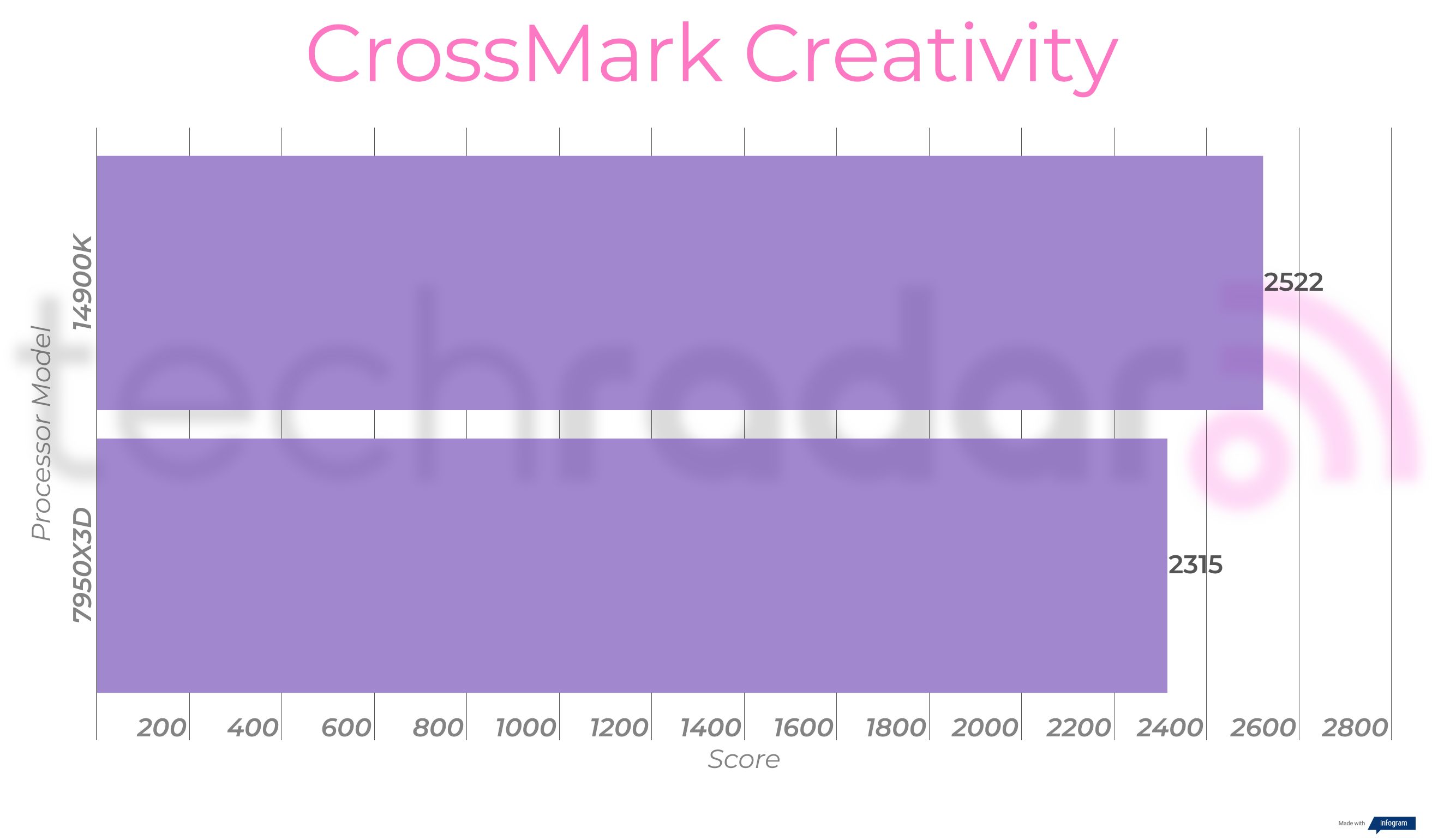
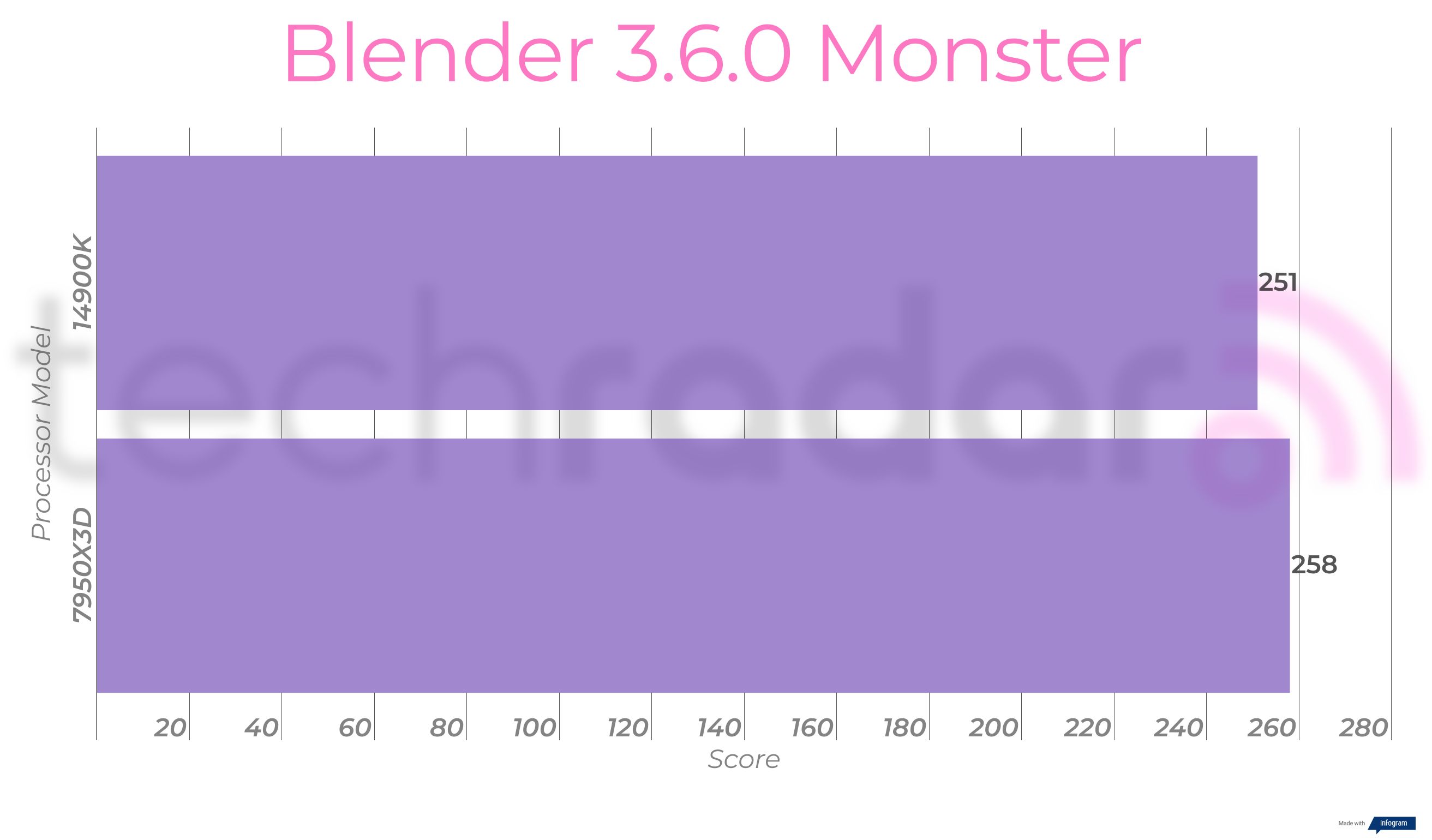
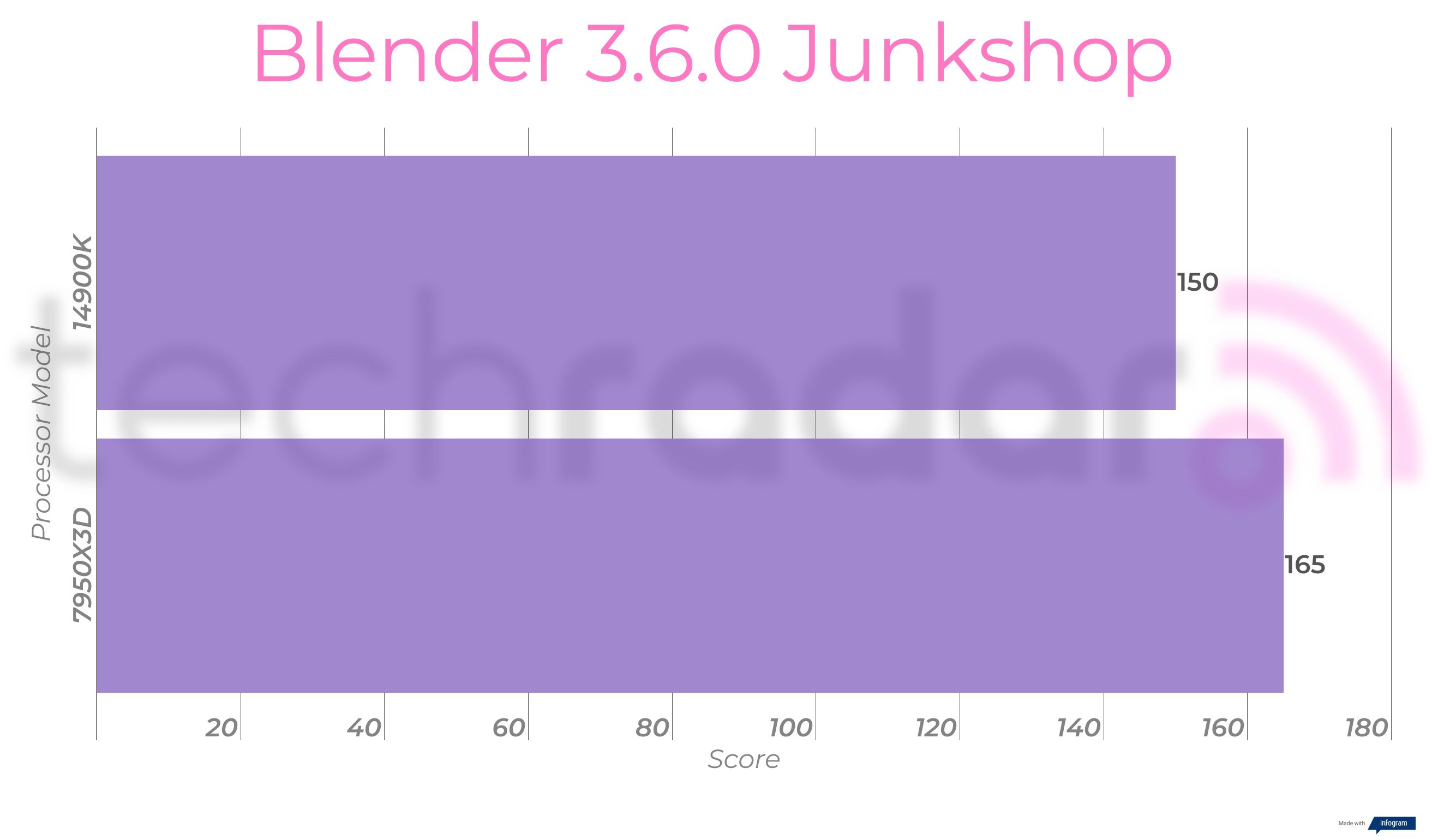
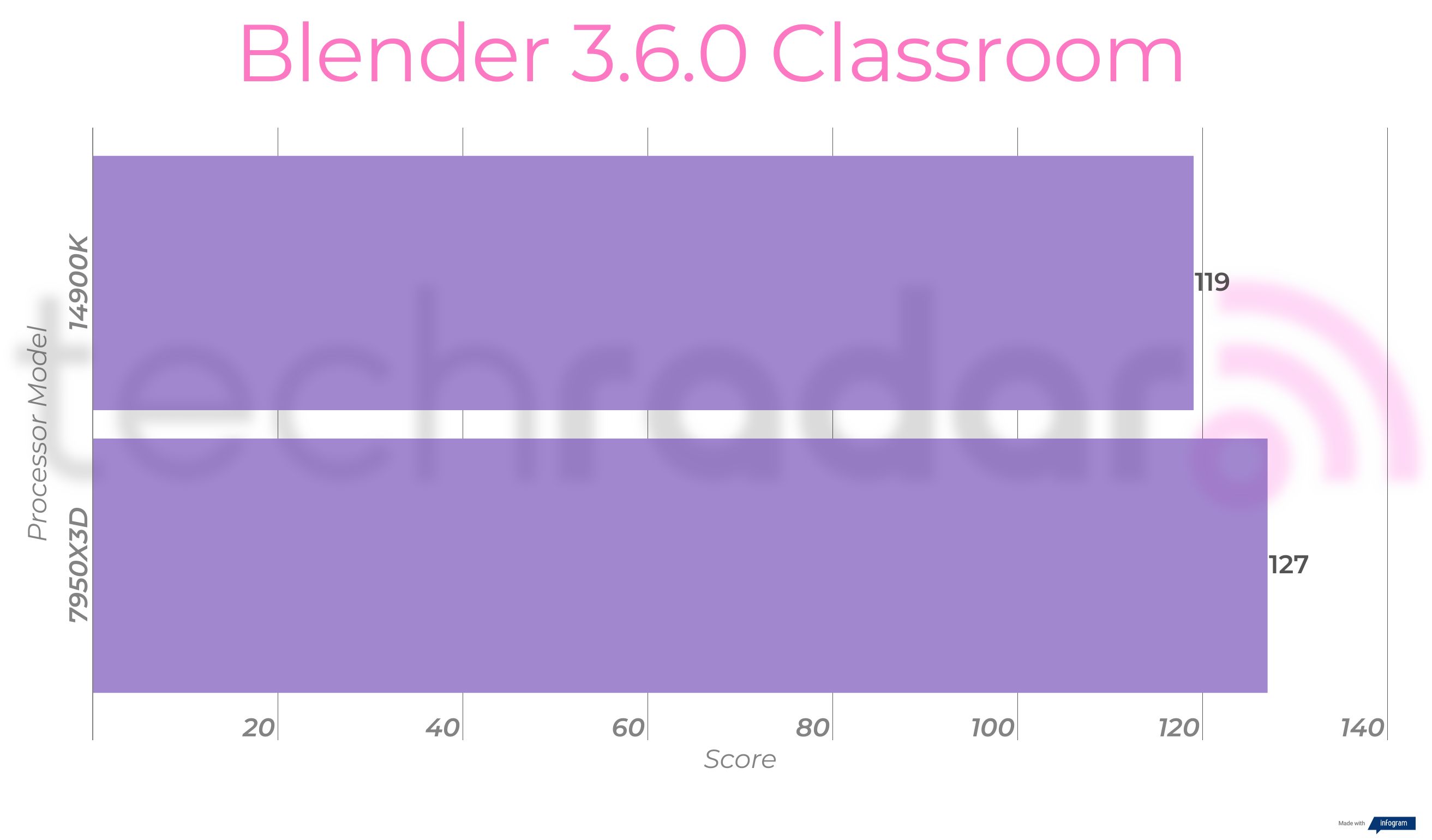
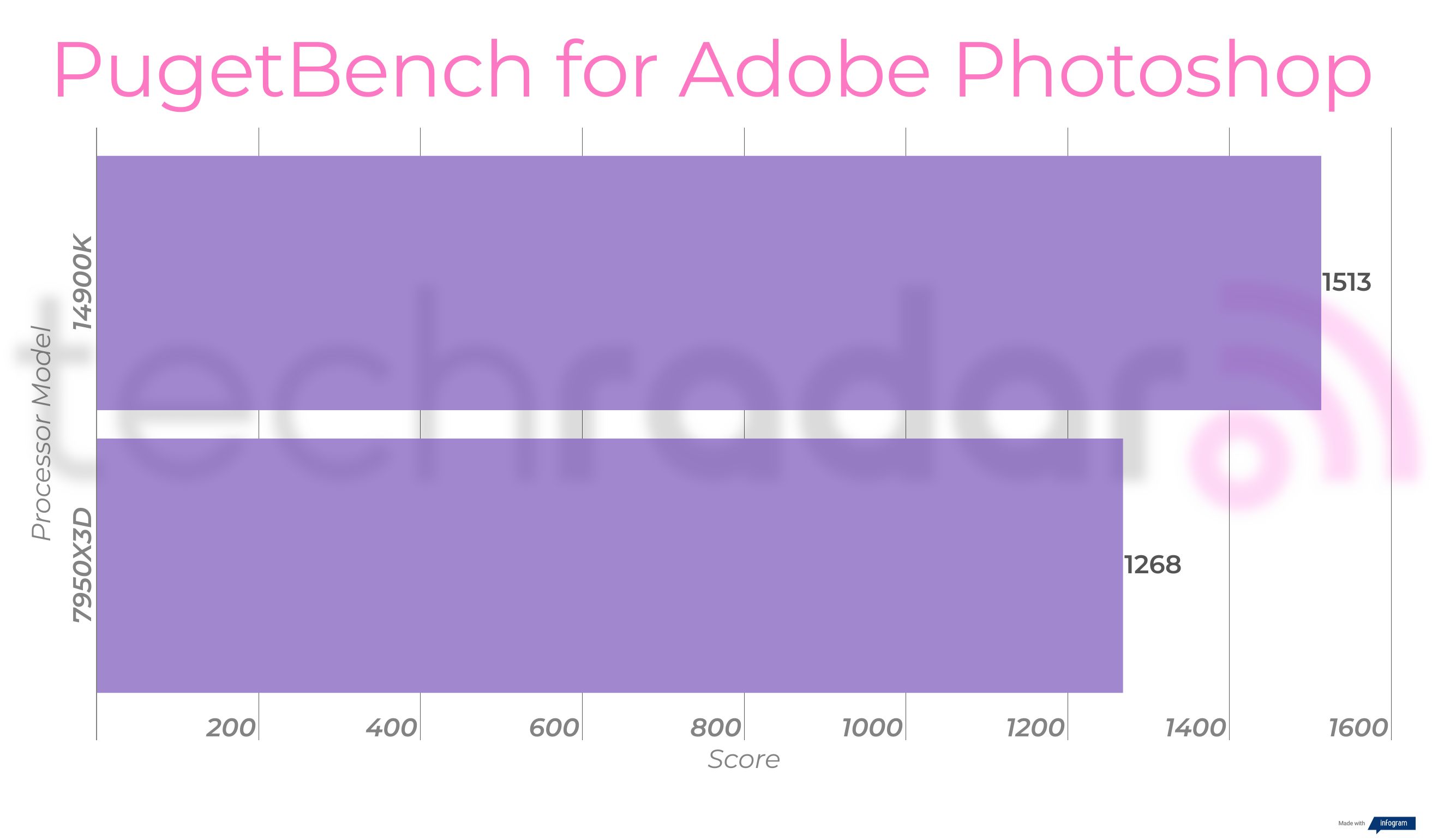
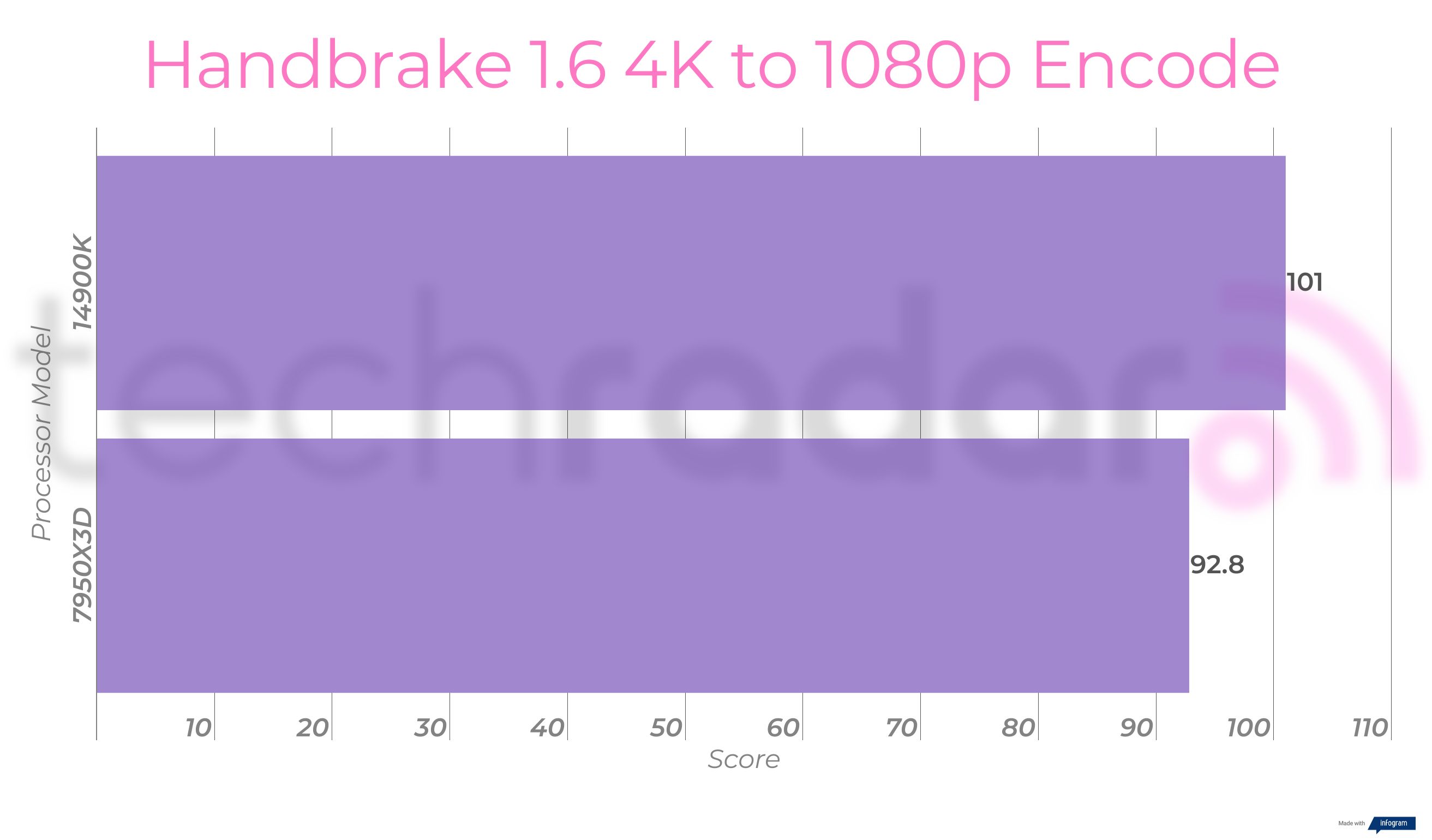
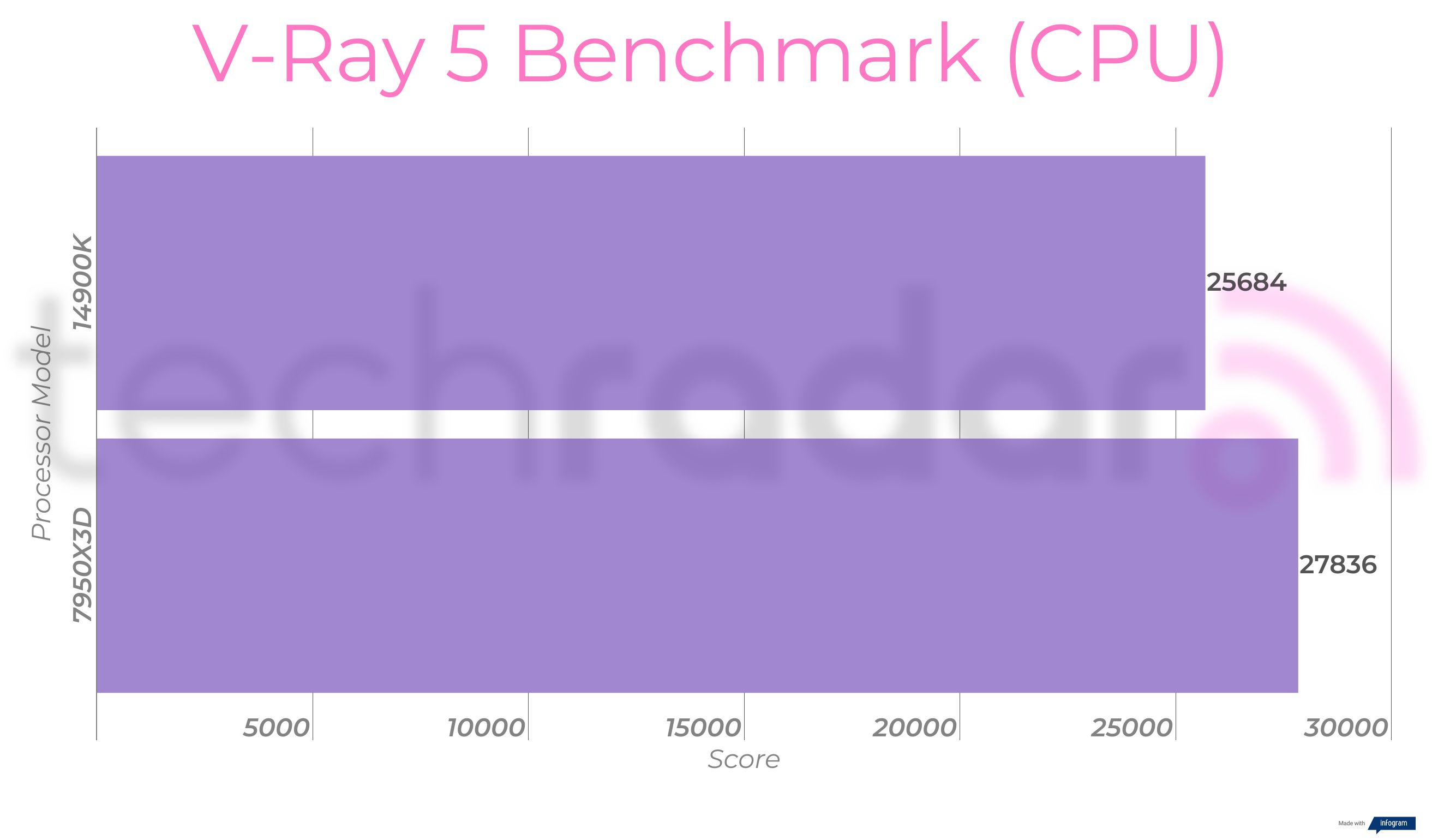
This is where the narrative starts to shift as the AMD Ryzen 9 7950X3D starts to overtake the Intel Core i9-14900K with the more intensive creativity rendering tasks. This is particularly noticeable with Blender and V-Ray 5, but Intel’s latest holds its own in a couple of areas as well.
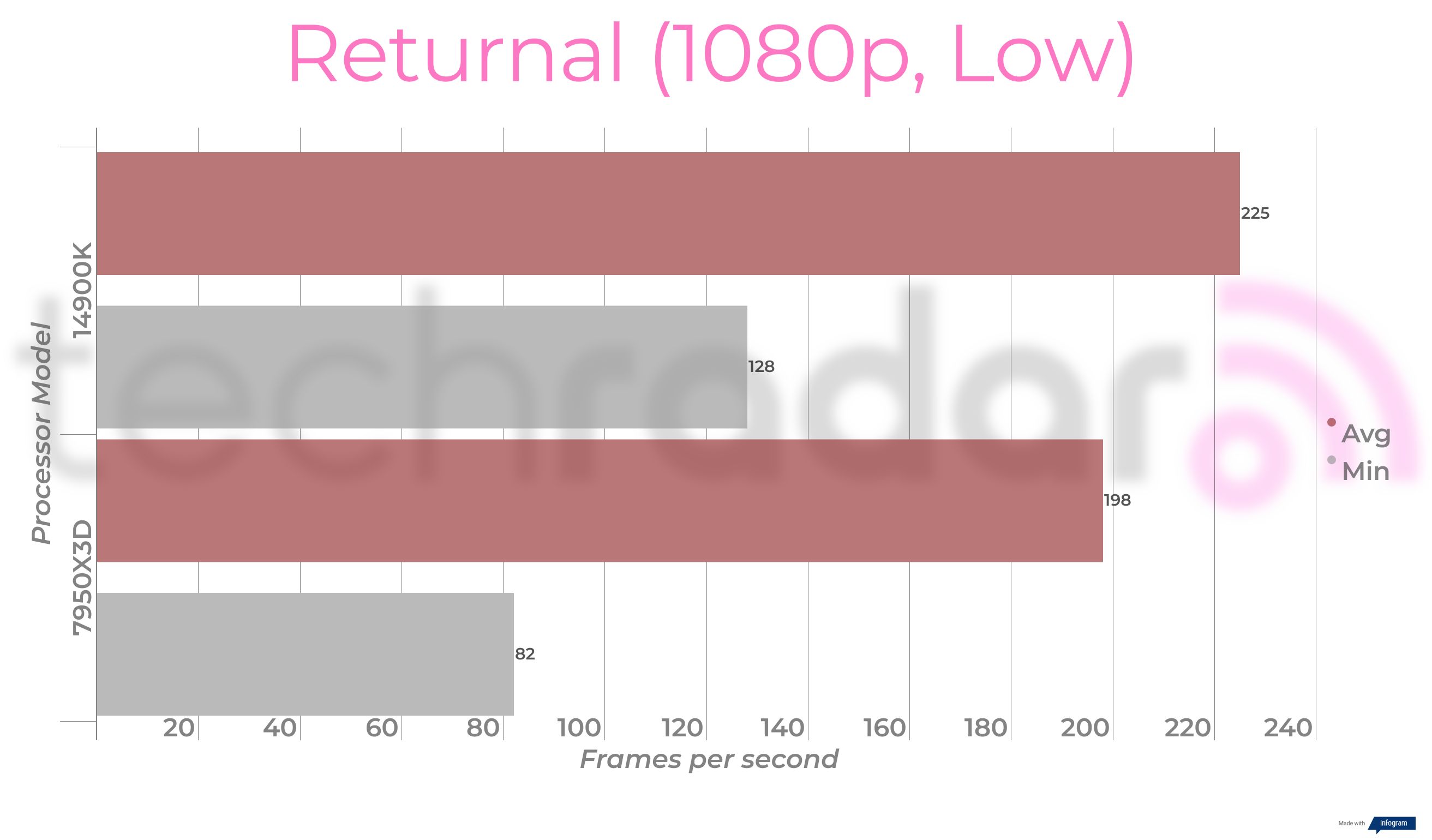
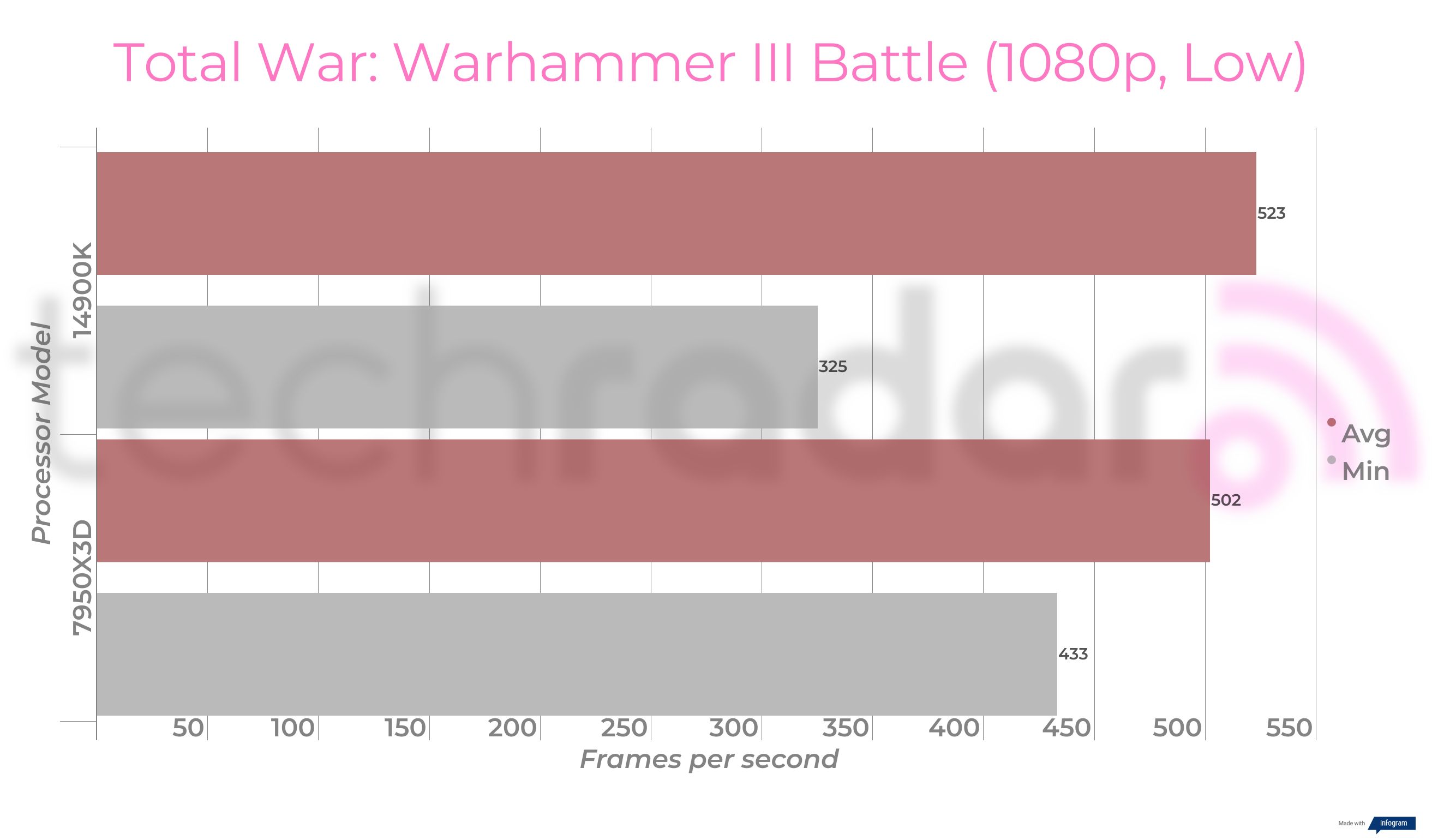
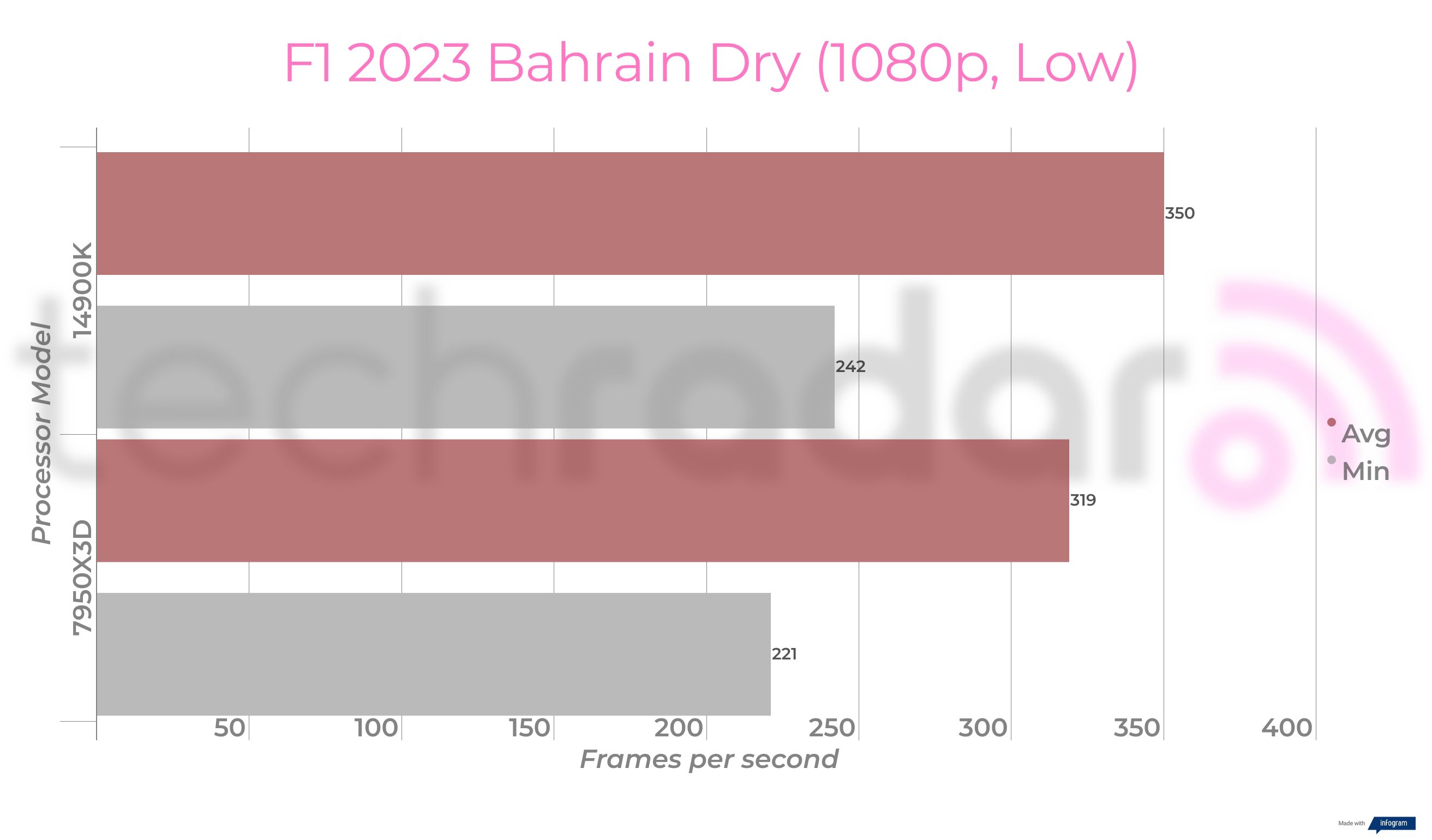
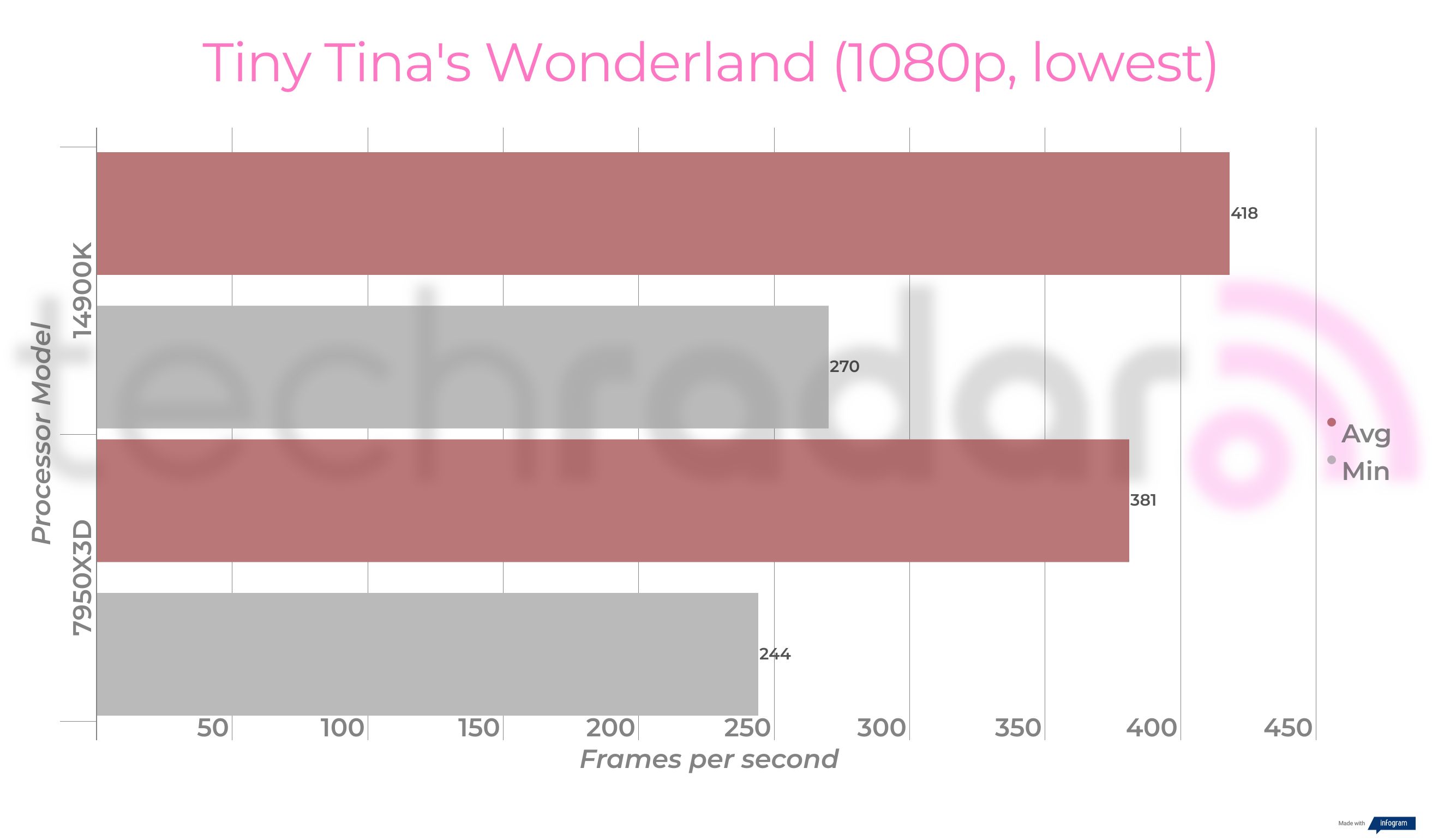
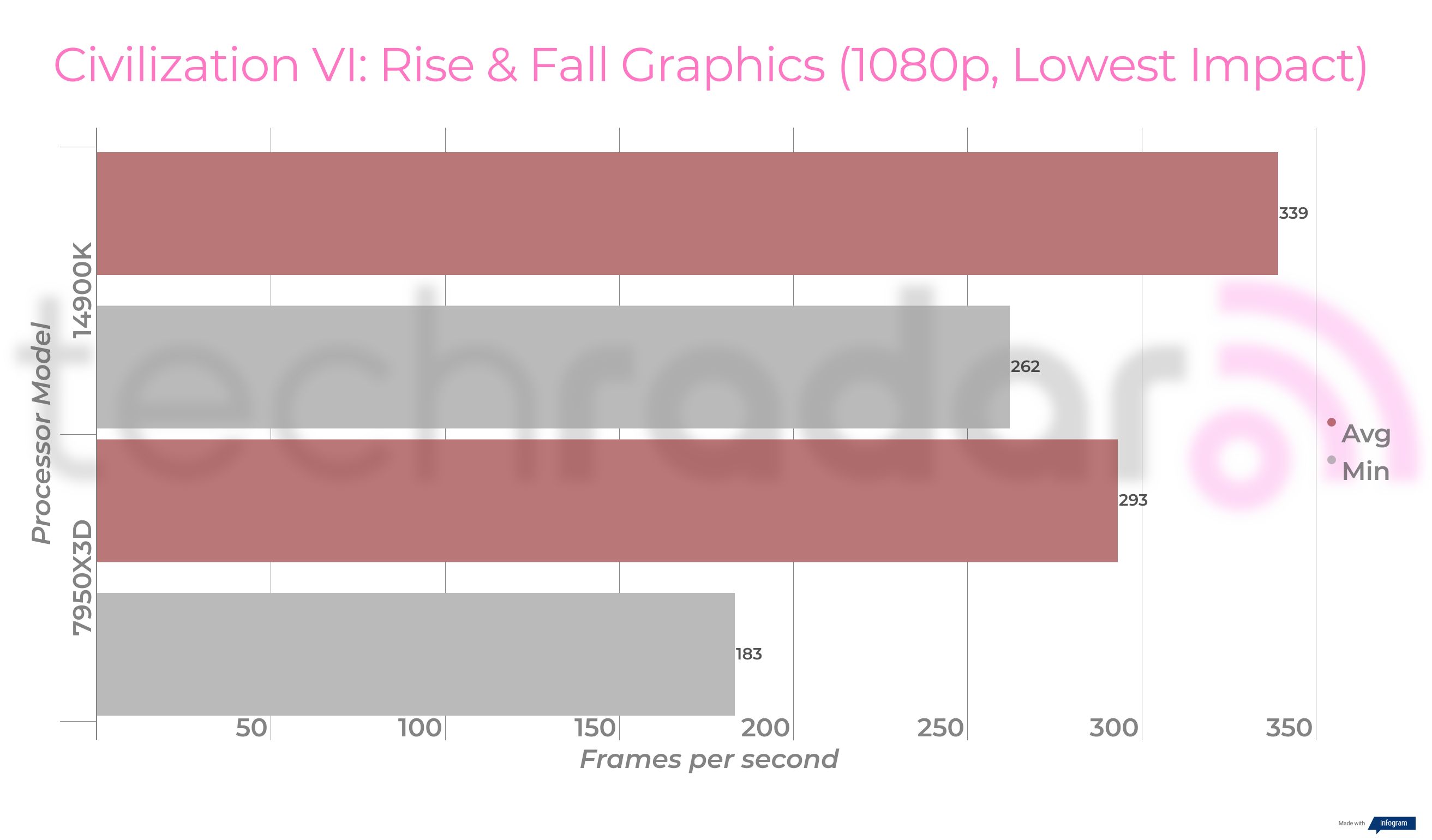
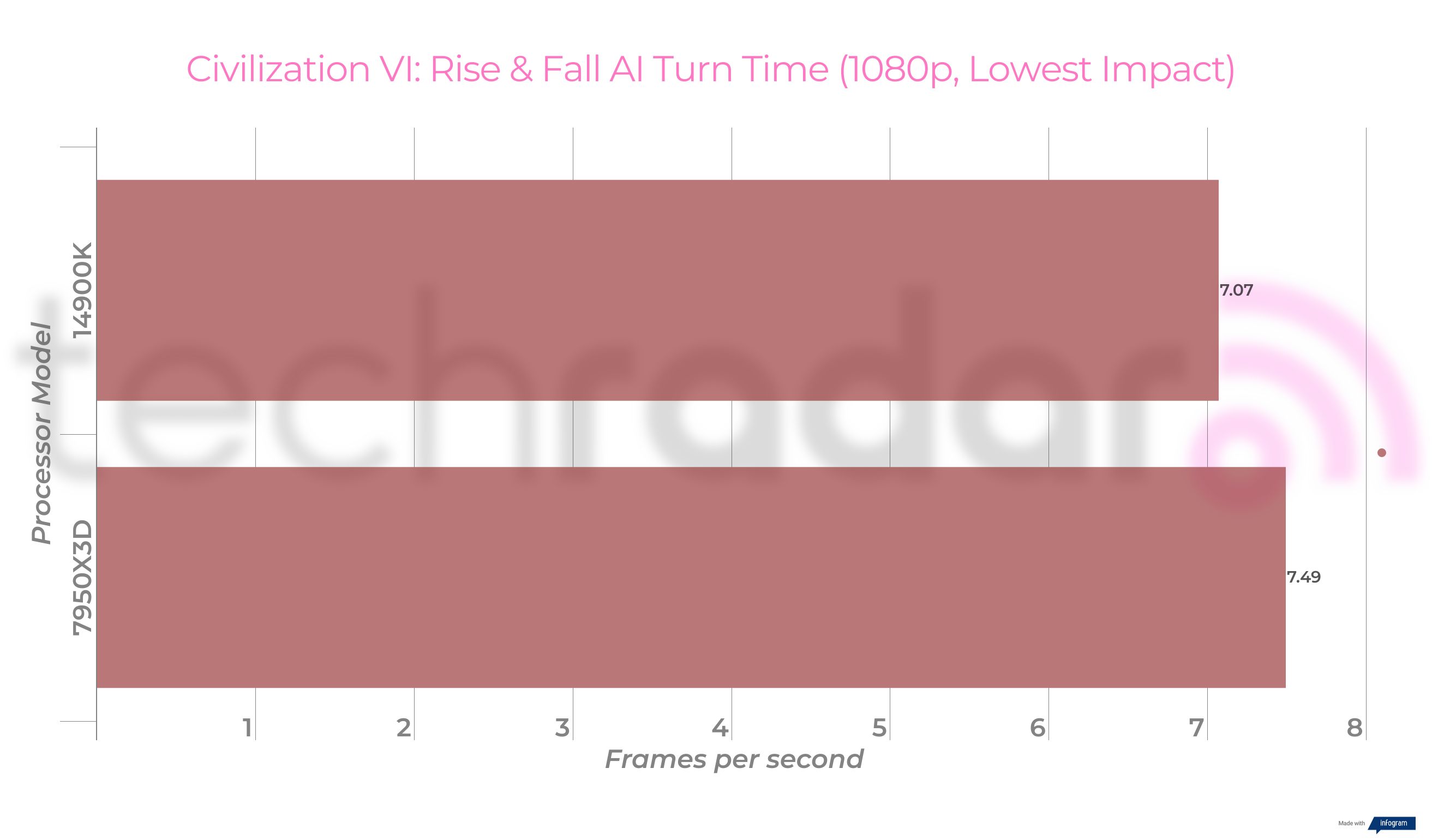
Surprisingly, the 7950X3D can’t quite keep up with the 14900K in terms of CPU-bound gaming performance as Team Blue leads in titles such as Returnal, Total War: Warhammer 3, F1 2023, and Civilization VI. It goes to show that even though the clock speeds were faster straight out of the box, and with the added 3D V-cache, it doesn’t seem to matter when up against eight more cores.
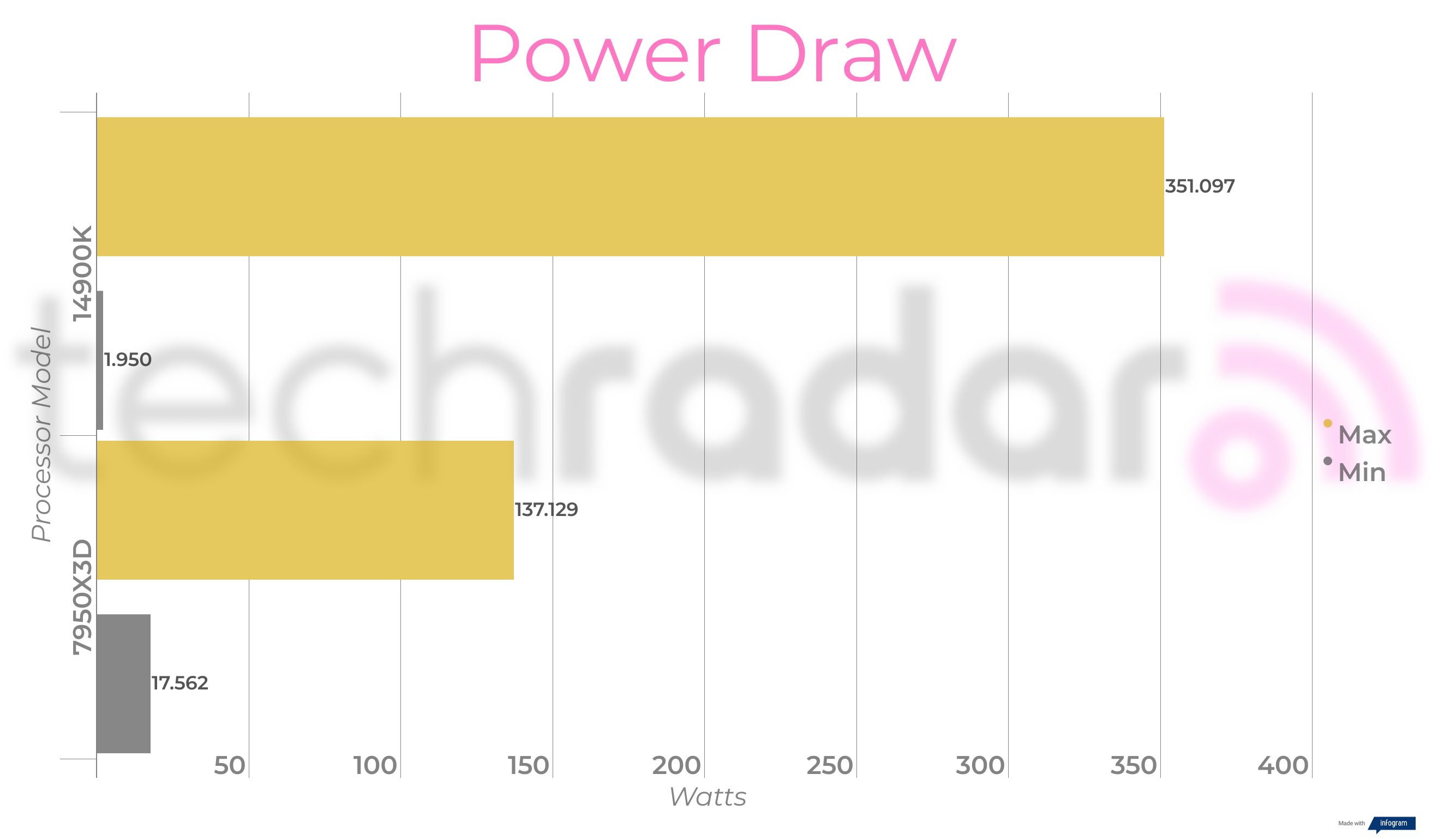
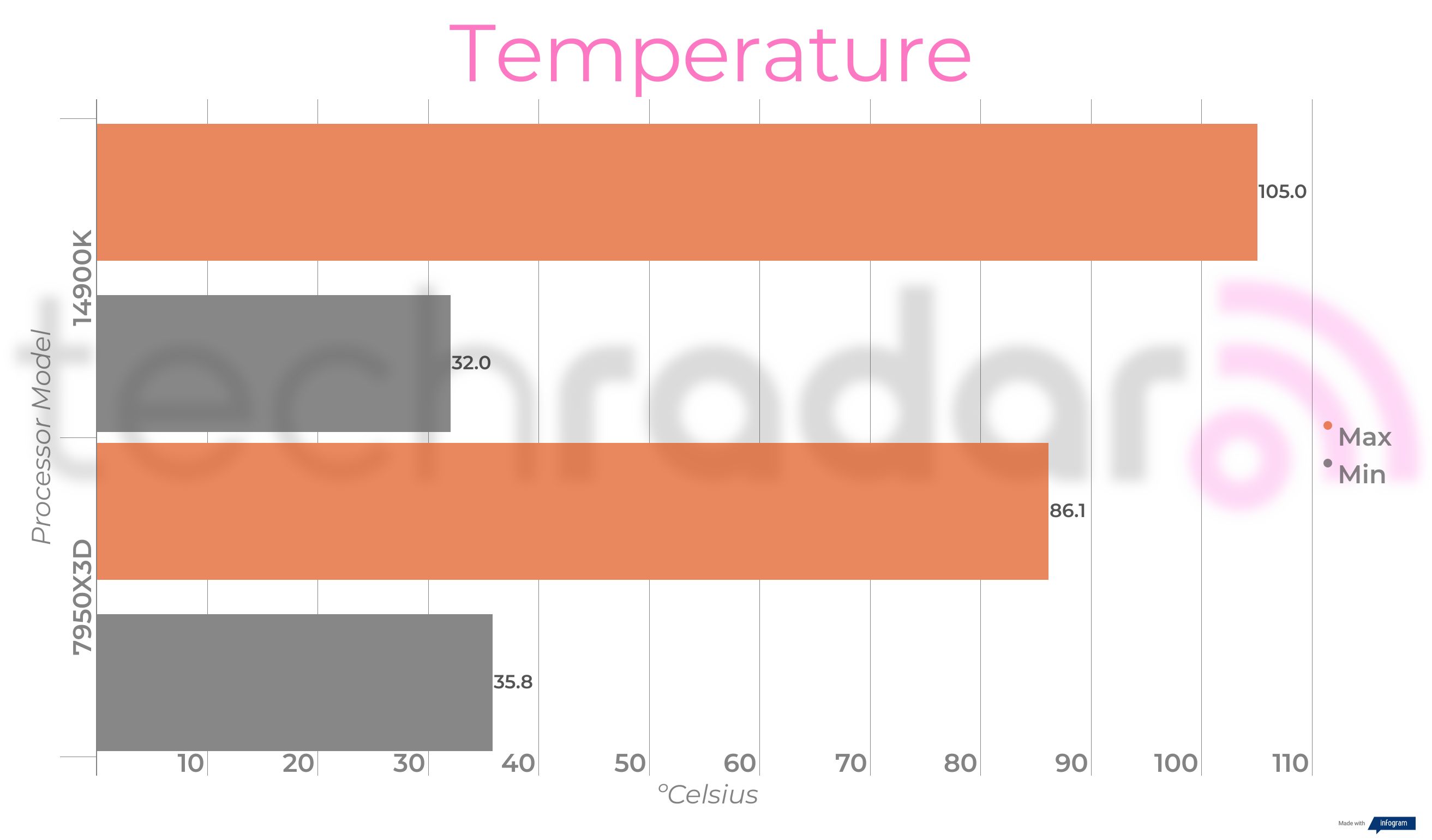
When looking at the thermal performance, the 7950X3D runs cooler at max load and runs more power efficiently when compared to how the 14900K operates. However, this comes at the cost of performance because Intel’s latest chip achieves higher scores in every single category including gaming performance and value for money to be the clear winner here overall.
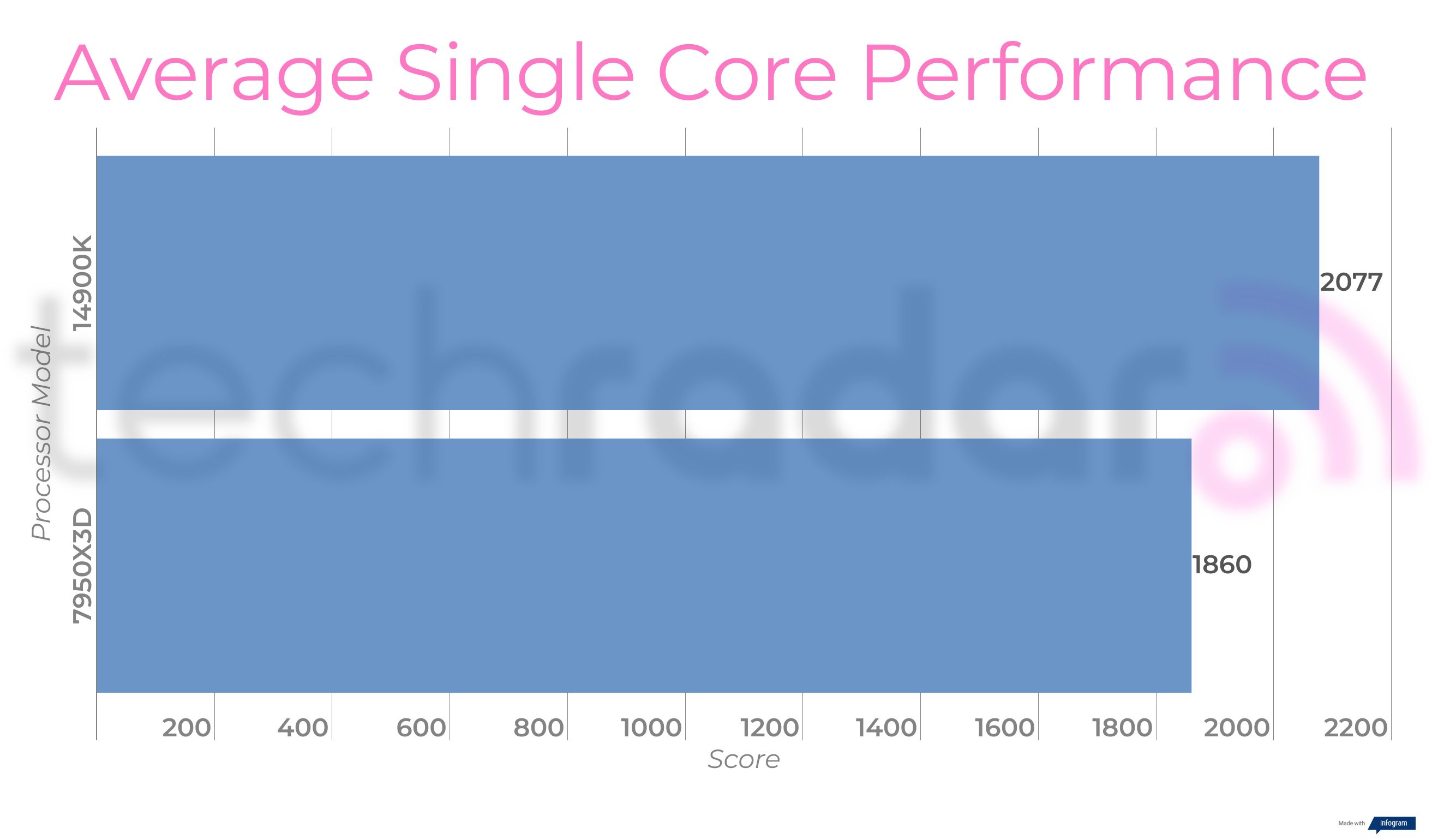
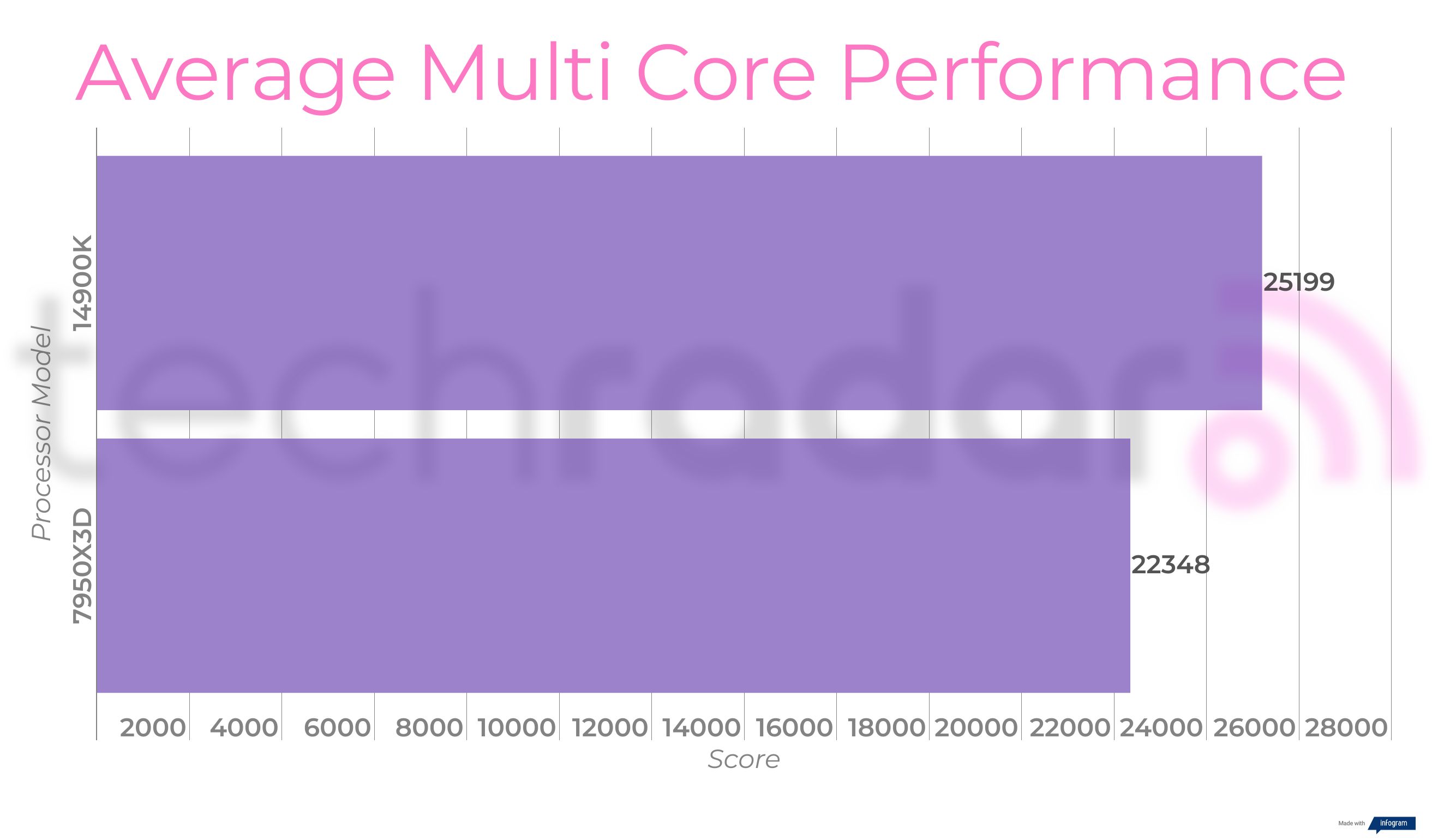
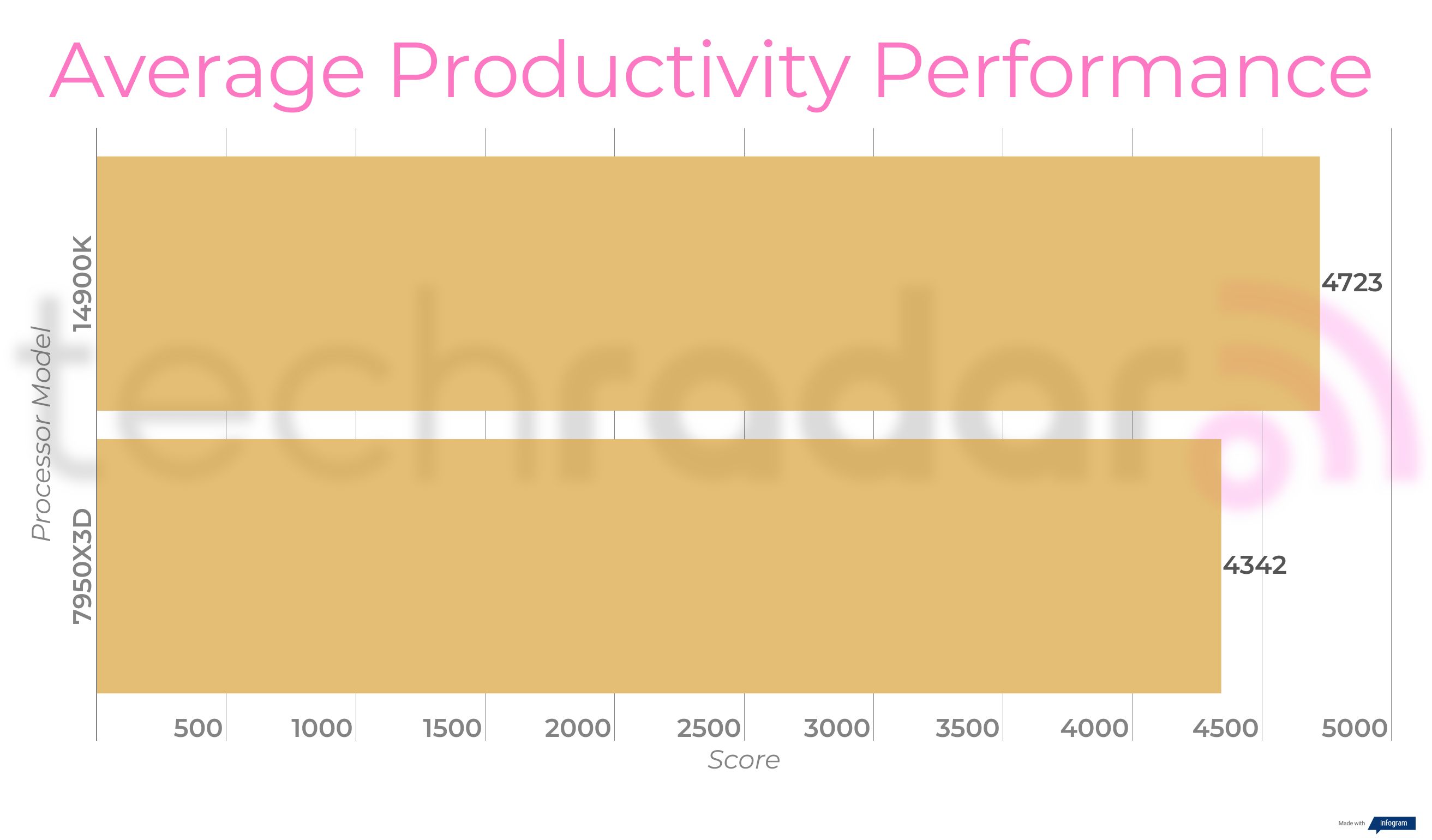
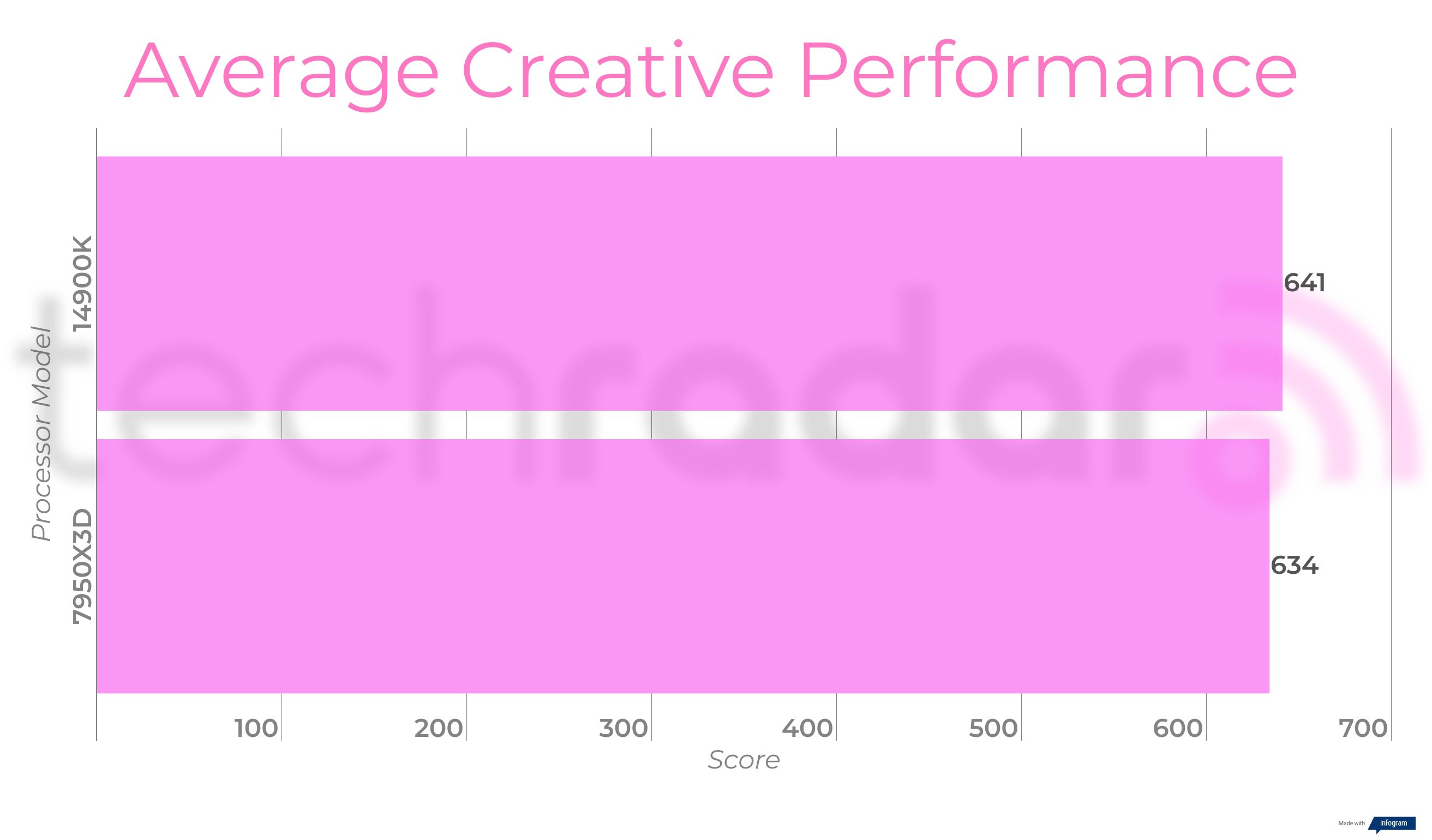
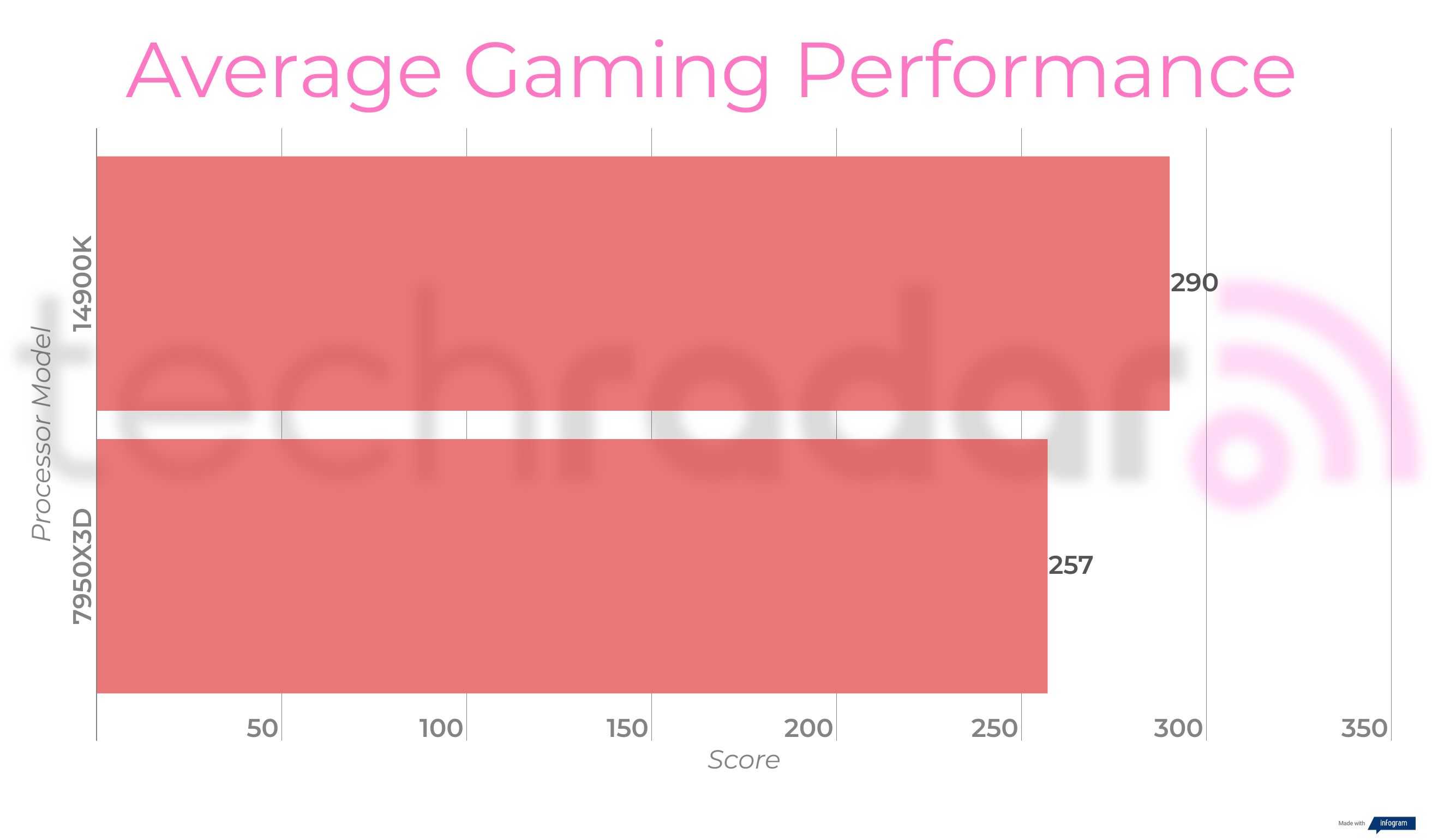
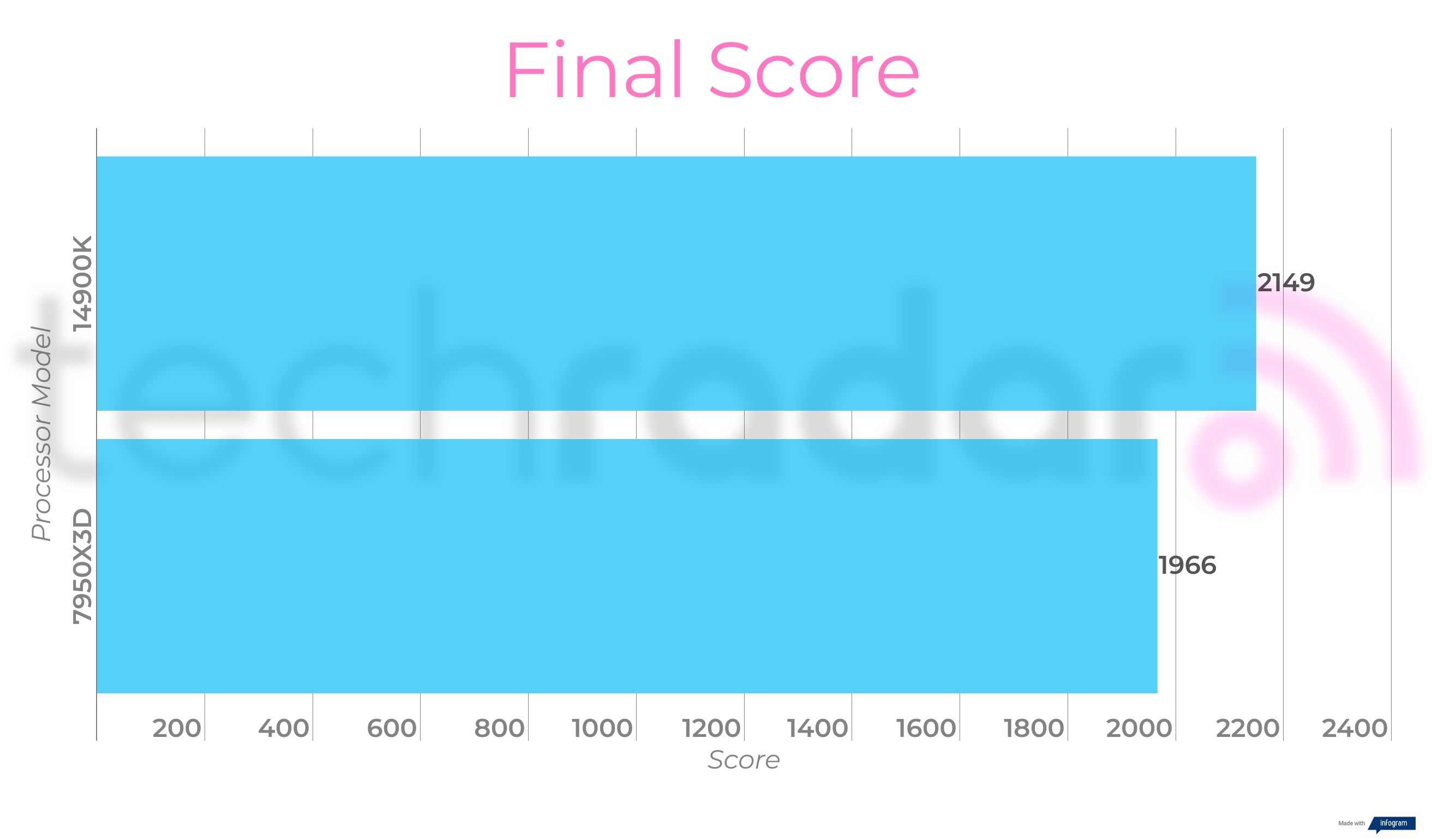
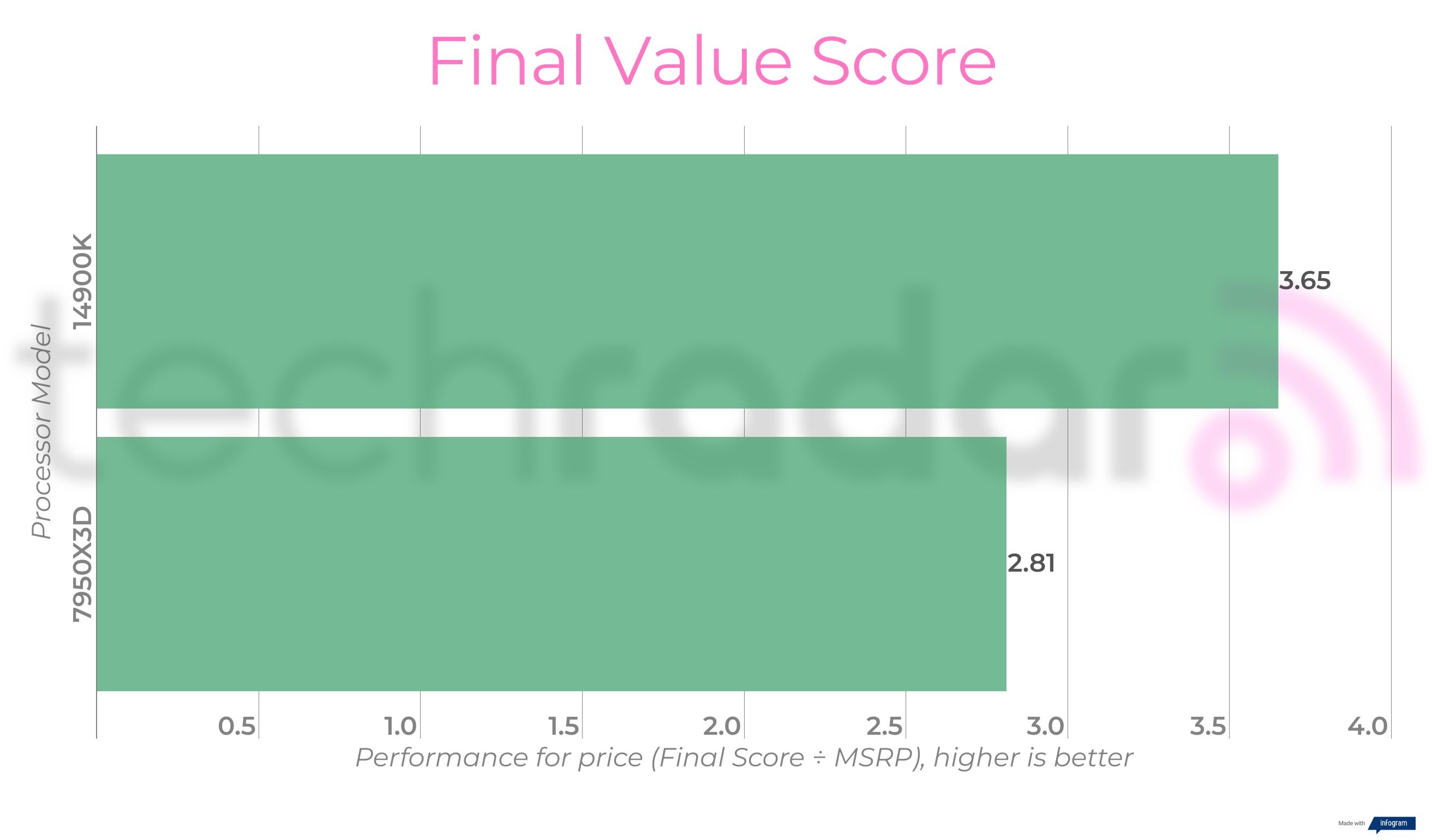
In total, there’s a difference of 12% average gaming performance difference between the 14900K and the 7950X3D which means the 3D V-Cache hasn’t helped out the way that the extra eight cores of the 14th Gen i9 has. While the 7950X3D performs admirably, it doesn’t quite dethrone the latest and greatest from Team Blue.
- Winner: Intel Core i9-14900K
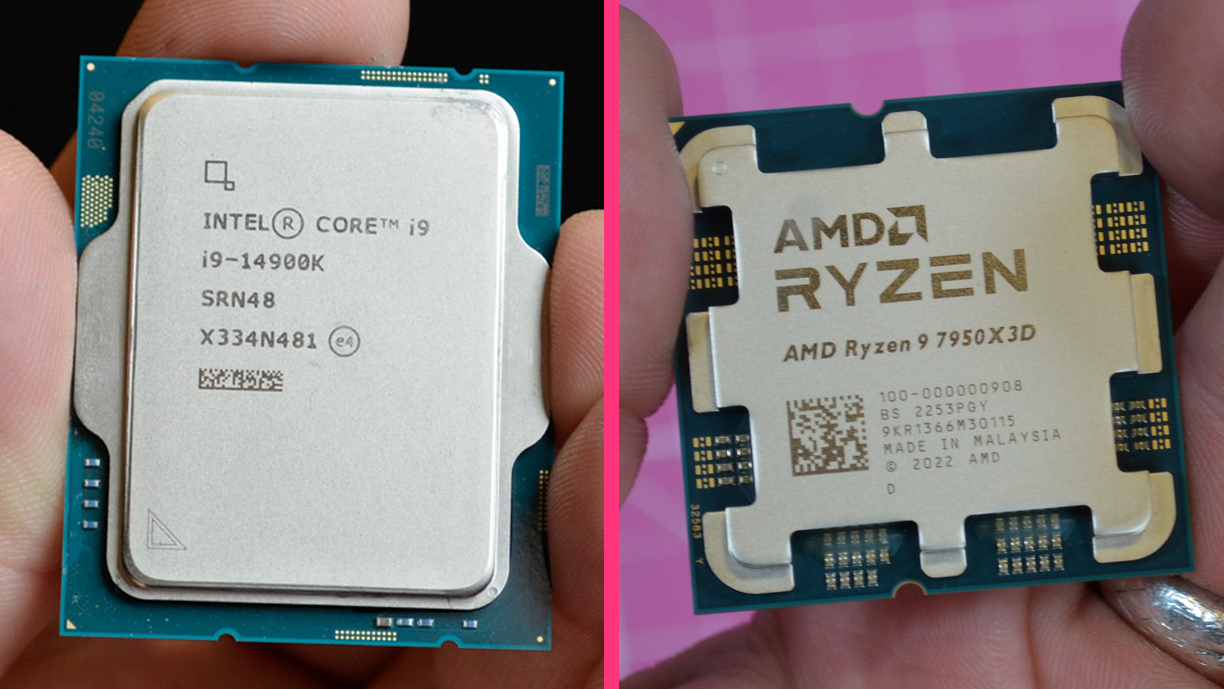
14900K vs 7950X3D: Final verdict
All told, this is pretty one sided in favor of the Intel Core i9-14900K in terms of gaming, creativity, productivity, and other synthetic benchmarks. Combine this with the fact that Team Blue’s chip comes in 15% cheaper than the 7950X3D, and there’s a decent case for the 14900K being the one to beat overall.
Combine this with the fact that the Intel Core i9-14900K supports the same LGA 1700 socket motherboards of the prior two chip generations, and DDR4 RAM as well as the best DDR5 RAM, and you have more versatility with your new PC build. If you want to build one of the best gaming PCs without spending top-end prices then you’ll want to consider the 14900K this year.
That isn’t to count out the 7950X3D, though. When we reviewed it earlier in the year we said that it retook the lead from what Intel was pumping out at the time. While iterative, the 14900K has done enough to shorten the lead and offer up a little more bang for the buck.

Formerly TechRadar Gaming's Hardware Editor, Aleksha McLoughlin is now a freelance writer and editor specializing in computing tech, video games, and E-commerce. As well as her many contributions to this site, you'll also find her work available on sister sites such as PC Gamer, GamesRadar, and Android Central. Additionally, more of her bylines can be found on Trusted Reviews, Dexerto, Expert Reviews, Techopedia, PC Guide, VideoGamer, and more.